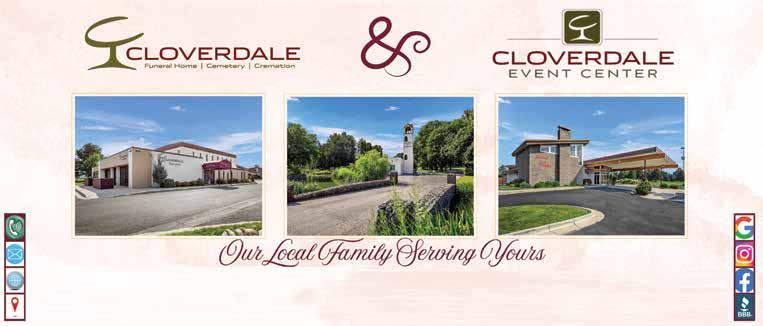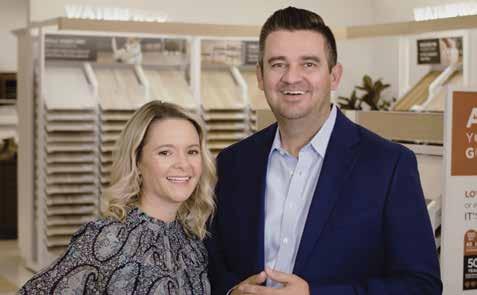





PUBLISHER
Sandy Jones • 208-703-7860 christianlivingmag@gmail.com
EDITOR
Gaye Bunderson
editorgaye@gmail.com
Submit story ideas, article submissions & press releases
GENERAL INFO christianlivingmag@gmail.com 208-703-7860
ADVERTISING & SALES
Kimberly McMullen • 208-703-7509 kim.bcliving@gmail.com
GRAPHIC DESIGN
Denice King • 208-918-5190 www.greentreedkdesign.com
Cyndee Wanyonyi
CONTRIBUTORS
Larry Banta, Steve Bertel, Daniel Bobinski, Rick Chromey, Tom Claycomb III, Ryan De Amicis, Jenna Dexter, Roxanne Drury, Joan Endicott, Greg Grotewold, Hilarey Johnson, Vincent Kituku, Rosie Main, Gary Moore, Mark Naito, Bethany Riehl, Bradley Shotts, Matt Sieger and Janet Thompson
DESIGN


By Sandy Jones
I think I say this each year. … Spring and Easter are my favorites, as I feel they represent the rebirth we experience as we become believers. What was old is now new. What was withered and gray is now green with fresh buds opening up and growing, embracing each new day! The air is somehow different too – fresh and crisp. It’s as if God is reaching out to all of our senses to remind us of how we felt the first time we believed, regardless of whether that was 50 years or 50 days ago.
What a good, good Father we have that He loves us so much! He not only sent His one and only Son to show us that He is The Way, The Truth and The Life, and ultimately die on the cross for us; but He continually reaches out to us, to let us know He’s always there.
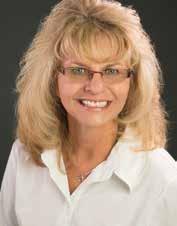
I’ve recently been at a pretty big crossroads in life and trying to make some significant decisions. Twice in the last 4 or 5 months I’ve asked for specific signs, even laying a specific fleece before The Lord, reminding Him that I am a pretty simple lady, and that He needs to speak loud and clear so that I don’t miss the message. Mind you, this is the same decision. Somehow I got in my little pea-brain that perhaps the answers I received in November might have changed by the end of January, so we re-visited my plea for direction.
“Who am I that you are mindful of me?” from Israel Houghton’s song “Friend of God” comes to mind as I type this, reflecting back on these times of prayer. Both times He answered within 24 hours, making it clear and decisive what direction He would have me go.
I come from a Wesleyan Arminian background, which means I believe I have freedom of choice. I’m not a puppet with God pulling my marionette strings. God gave me a brain, and I’m called to use it. He also shows us the value in praying for wisdom in the story of King Solomon, who could have prayed for anything at all and yet he prayed for wisdom, and was granted it.

“Behold, I give you a wise and discerning mind, so that none like you has been before you and none like you shall arise after you” (1 Kings 3:12b).
And so I prayed, expecting a long wait, only to be surprised by His quick and decisive messages – yes messages, plural, making sure that even a simple, pea-brained grandma like myself couldn’t miss the significance of what He was saying.
I’ll be honest – in November it was a relief; late January/early February it wasn’t what I wanted to hear at all. Time changed me, but it didn’t change our Lord. What I do know is that He will continue to be faithful to give me the wisdom, discernment, and the strength to do what He’s made it abundantly clear I’m to do. It’s my choice whether to revel in His answer or to do so grudgingly. I choose joy for I know His Word is true as stated in Hebrews 13:21:
“May he equip you with everything good for doing his will, and may he work in us what is pleasing to him, through Jesus Christ, to whom be glory for ever and ever. Amen.”
The road is not always an easy one. What, dear reader, will you choose? Will you choose joy as well?
Until next time…
God Bless! n
Speaking of choosing; we know you have many choices of places to shop and services to use, and we would be so grateful if you would choose to shop and use those who have chosen to support us through their advertising dollars. Without the support of our advertisers, there simply wouldn’t be a Christian Living Magazine. We are so grateful to them, not only for their financial support, but their encouragement to us as well.





By Mark Naito
Did you know tech is affecting everyone’s mental health and overall well-being? Experts, who are former executives of major technology companies and are featured in the documentary “The Social Dilemma,” have been saying this since 2013.
Key things to discover how you can see this for yourself is to ask yourself the following:
• Do you struggle with finding yourself deleting certain apps and then reinstalling them?
• Do you feel drained, mad, or frustrated after getting off your tech device?
• Do you sometimes feel like you are missing out on something?
• Do you have an urge to see if there is something in your alerts, favorite app or in general?
• Does something pop up in your feed that you were just talking to someone about or thinking about?
If you answered “yes” to any of these, then it is time to look at something like a reset tech kit that will educate you on how to be intentional with tech and avoid the pitfalls of it. Explore the world of “intentional tech” and you will find relationships improve, you have more time and, overall, experience better health. n
Mark Naito is an Intentional Tech Expert. For more information, visit www.navtechfam.com.







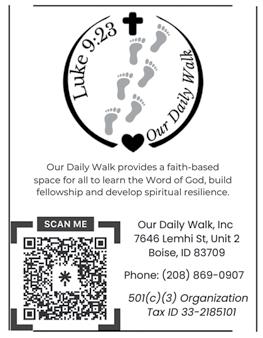


By Janet Thompson
While I was finishing the first of three fish tacos on my plate, my friend was polishing off her third.
At banquet tables or eating out, I’m the last one to finish eating while the waiter hovers over my shoulder wanting to take away my plate.
I’m a slow eater. Some might say that’s because I talk a lot and like to socialize over a meal, but I also like to enjoy my food. I chew carefully and take my time between bites. I’ve been amazed at how fast some people eat. The trend toward eating “fast food” at “fast food restaurants” has definitely turned us into a population that eats too fast. Or our schedules are so overcrowded that we have to gulp down our food so we can get to the next life event.
Nutritional experts agree that learning to eat slowly is one of the simplest, yet most powerful, things you can do to improve your overall health. Now that’s worth slowing down and learning about!
I’ve often had the fleeting thought that if I eat fast, I can eat more delicious food before my stomach tells me I’m full. That’s actually true. Or if I hurry through a meal, I’ll still have room for dessert. That might be true too. But I can guarantee you, I’ll soon be looking for the Tums to settle my stomach and I won’t be too happy when I step on the scales.
It takes about 20 minutes from the time you start eating for your brain to send out satiety signals. So theoretically, you could eat more if you eat fast, but that defeats any attempts at losing weight or helping prevent indigestion.
I’ve observed that the majority of people today don’t have meals that even last 20 minutes.
There’s no fooling our metabolism. No matter how fast you eat, more food still turns into more calories and possibly more pounds, any way you slice it.
Leisurely eating allows ample time to trigger the signal from your brain to signal when you’ve eaten enough and it’s time to stop. If you don’t let your body register that you don’t need to eat any more food, you could easily eat far more calories than your body needs.
The study to illustrate the importance of slowing down your eating if you’re trying to lose weight appeared in the January 2014 issue of Journal of the Academy of Nutrition and Dietetics.
Researchers found that you might consume fewer calories over the course of a meal when you eat slowly. An additional finding was that normal-weight people tend to chew more slowly in general than those who are overweight or obese.
When we start eating, our body needs time to prepare for digesting our food. If you eat fast, you often don’t chew as carefully and take in extra air with every bite. So food arrives in your digestive track as a large lump before all the enzymes can get there to break it down and extract the nutrients. Improperly digested food mixed with air is going to give you a tummy ache.
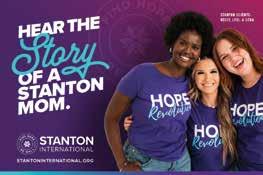
A too full feeling isn’t comfortable, so if you let your body gradually reach its satiety point, you’re going to feel more satisfied, consume less calories, and let your body go through a healthy digestive process.
If you say, “I’m so full I couldn’t eat another bite,” you’ve probably eaten too fast. Eating slower and reaching a comfortable satiety point means you’re satisfied before you feel “full” and uncomfortable.
If you’re hungry an hour or so after a meal, you may have eaten so fast you never let yourself reach the satiety point, resulting in eating between meals.
If you can’t remember what you ate at your last meal.
If you look up from your last bite, and everyone else at the table still has full plates.
If you often suffer from gas, bloating, or a tummy ache.
If you never feel satisfied after a meal.
If you take second and third helpings.
If meals at your house are something to rush through instead of savor and enjoy.
If you hear yourself saying to your kids, “Hurry up and eat!”
Dr. Jan Chozen Bays, author of “Mindful Eating: A Guide to Rediscovering a Healthy and Joyful Relationship with Food”, says, “I think the fundamental problem is that we go unconscious when we eat.” So how can you stay in the moment while you’re eating?
Chew slower. The consensus is that we should take 40 chews per bite.
Eat raw and unprocessed foods that require more chewing.
Focus on what you’re eating – how it tastes, its texture, and if it’s pleasurable.
Don’t eat while watching TV, texting, looking at your phone or at the computer, or driving.
Try not to eat alone. Engage in conversation with others.
Put your fork down frequently.
Stop and take drinks of water between bites.
Eat three regular meals.
Don’t go more than four hours between meals. When you’re starving, you eat faster.
Don’t eat standing up. Sit comfortably, preferably at a table.
Create an inviting eating atmosphere. Set an attractive table with placemats or a tablecloth and maybe even a vase of flowers.
Stop and enjoy every bite.
“Fear less, hope more; eat less, chew more; whine less, breathe more; talk less, say more; hate less, love more; and all good things will be yours.” – Swedish proverb
On the next page is the recipe that is a favorite at our church potlucks, where I obtained the recipe. I like to serve it for company or parties. Everyone always wants the recipe. n


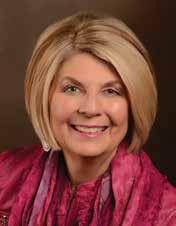

Janet Thompson, award-winning Christian speaker, freelance author, and author of 20 books, is also the founder, director, and God’s servant of Woman to Woman Mentoring Ministry and About His Work Ministries. Her passion and focus is mentoring the next generation. Her tag line is, “Sharing Life Experiences and God’s Faithfulness.” She has a BS in Food Administration, MBA, and Master of Arts in Christian Leadership. Check out her books and sign up for her free weekly online blog and monthly newsletter at womantowomanmentoring.com. Join her on www.facebook.com/Janetthompson.authorspeaker, LinkedIn, Pinterest, X, and Instagram.
• 1 lb. boneless cooked chicken breast shredded or 2 cans Costco canned chicken drained
• 1 32 oz. box of chicken bone broth
• 1 16 oz. jar salsa
• 3 15-oz. cans white beans, undrained
• 8 oz. block pepper jack cheese, cubed
• 2 tsp cumin (or more if you like it spicier)
Combine in crockpot or in cooking pot on the stove. Cook until heated through, flavors blend, and cheese melts.
Serve with topping options: sour cream, grated cheese, cilantro, chopped onion, diced avocado, and Fritos, or we like Trader Joe’s Organic Corn Dippers.
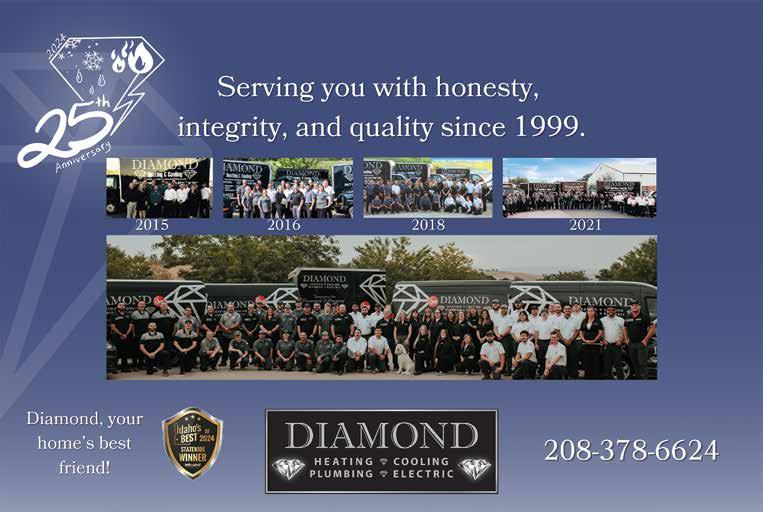
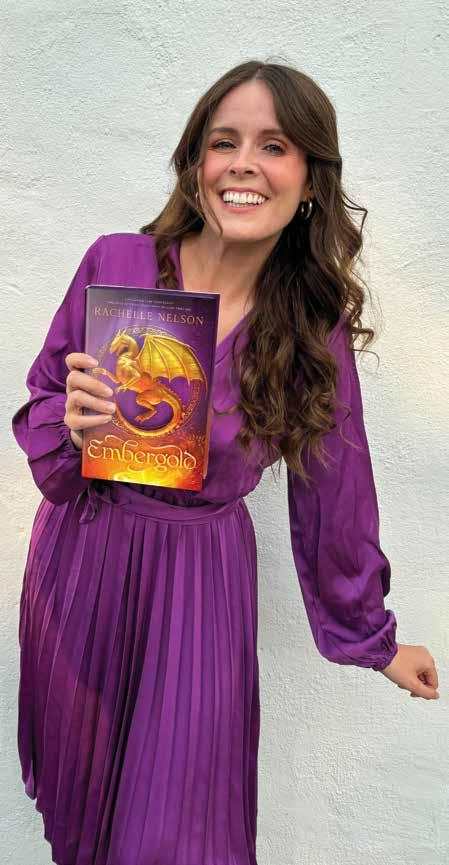
By Hilarey Johnson
Rachelle Nelson always loved kids. She taught Sunday school, was a teen mentor, and a Quaker Hill camp counselor. Even while she attended college, she mentored younger students on the Boise State campus.
People “coming of age” drew her because it had been a formative time in her own life. Even though her parents raised her up to know the Lord, Rachelle had had questions about God as a young adult that remained unanswered. She has never tired of processing ideas and encouraging young people in that same season.
Rachelle was 11, the same age as Harry Potter, when the first of the book series published. She grew up with the characters. During this time, she acquired both a love of reading and the wonder that C.S. Lewis wrote about in the book “On Stories: And Other Essays on Literature,” where he discusses a child who reads fairy tales. Rachelle learned to be captivated for that thing just out of reach in the real world, but which draws us in when we read of enchanted forests – making all woods a little enchanted.
It fostered a delight in using her imagination. She loved to read, paint, write poems or make music. Therefore, she knew she also wanted to marry someone creative. She met her husband, a creative musician, Jared Nelson, when she was 22. He had also been a youth leader. They naturally ministered together, leading mission trips and small groups even when they were just a handful of years older than those they discipled. They sing together under the band name Nelson at the Helm. At one of these youth events, there was a whiteboard where people were encouraged to write future goals. She wrote that someday she would write a book. It sounded fun – but wasn’t something that burned inside of her just yet.
Around this time, Rachelle read a sci-fi, dystopian allegory called “Arena,” by Karen Hancock. She had begun to grow serious about the Lord, and realized that some books she loved to read – those which had imaginative, magical worlds – could be incongruent with her faith in Jesus. This book showed her she could integrate creativity and her faith. Realizing that the human imagination could honor God was a big deal to her.
But, she started to struggle with chronic illness. The latter part of her 20s became a blur with extreme lethargy, migraines, pain, doctor visits and an auto-immune diagnosis. She could no longer maintain a full-time work schedule.
She turned 30 years old just before 2020, and it was a wakeup call. Her heart cried out that she could not just accept sleeping 12 hours a day with an inability to function and living with constant pain. She poured herself into discovering what her symptoms meant.
You’ve probably been warned about researching symptoms online during a crisis because the conclusion will be the false fear that you’re dying of a brain tumor. That’s exactly what her research led her to – but this time, it was true. When doctors confessed they didn’t know why the panels from her blood work were so far out of range, she took what she found online and self-diagnosed an active Prolactinoma brain tumor. Her doctor ordered an MRI. A one in a million chance meant it was rare enough that no doctor she’d visited had ever come across it.
She began treatment in the spring of 2020, just as the world shut down. Part of the medication to suppress the tumor was a bi-weekly release of dopamine. However, treatment came with a warning that she might have compulsive behavior. She was supposed to be wary if she wanted to drive to another state, spend a lot of money, take up gambling or any other random and obsessive thoughts.
What she did was contemplate her situation. The world had shut down and she’d been laid off… but she felt amazing. She was filled with energy when her body no longer had to fight the brain tumor. Suddenly, she had both time and energy to write a story. She’d had enough life experience, pain and imagination to craft a bona fide fantasy. All of her pent up creative energy poured out. It happened quickly.
The first draft was, in her own words, “a dumpster fire.”
So, she audited a college-level course on YouTube from famous fantasy author, Brandon Sanderson, about how to write science fiction and fantasy.
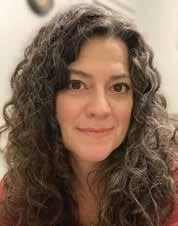
Rachelle finished two semesters, revised her manuscript and sent it out with loads of negative self-talk. Thoughts like, “What do I do now?”, “Nothing will happen,” and “Who am I to write?”. Immediately, she received several offers. She accepted one from Enclave Publishing, a traditional, royalty-paying, Christian, speculative fiction publishing house. “The Sky of Seven Colors” is available from the same publishing house printing the 20th anniversary edition of “Arena” – the first inspiration that made her hope she could weave her love for story with her faith in God.
Rachelle is extremely grateful for how much they taught her. Even then, she knew she was in over her head. A needed step for writers and authors is to attend a writer’s conference, and her first conference was Realm Makers. A gathering specifically tailored for Christians who write in fantasy and speculative fiction genres. While she was there, her publisher asked, “What’s next?” Her dreams were vivid, and her imagination was wild… she had no lack of ideas. But doubt crept in. It’s standard for authors who have written a book to wonder if they can do it a second time. It’s part of the sensitivity of a creative: letting ideas flow in and out. For Rachelle, besides asking, “Who am I to write?”, she wondered if success had only been possible because of the boost of energy from the medication. Her health was now stable, she was no longer compulsive. Writing had become more work.
However, Rachelle also thought, “I only have one life… I only get one voice… one brain…” And she decided, “Why waste it for fear of not being enough?”

Rachelle encourages everyone, whether you feel writing is part of you, or a calling, to be around other writers of faith. She says that writing takes so much work, requires so much creative power, parts of your own story and your inventive mindspace – but it produces little income as a reward. She says, “You have to know why you are writing,” and laughs that you could never be paid enough for something this energy-consuming. It must be a passion.
That’s why she’s connected with the local faithbased writers’ group, IdaHope Christian Writers (ICW). They understand the passion and, while being goal-oriented, they focus more on the “heart of the writer,” the relationship with God and others. On April 26, 2025, Rachelle is teaching a breakout session at the ICW conference for young adult writing, if you feel that passion.
Rachelle Nelson’s second book, “Embergold,” releases March 2025, the same month as this issue of Christian Living Magazine. Think: character-driven story full of courage and healing, romance, isolated settings, and dragons with broken hearts.
Rachelle says, “YA stories captured my imagination when I was young. In so many ways, reading can feel like experiencing a life that is not our own. We walk through the wisdom and the perspectives of the author who spins the tale. Some of those tales helped me to have courage as I navigated adulthood, and to experience first in books what I later learned in real life: that good can come from sorrow. Those are the kinds of stories I want to contribute to today’s world. When things are dark, we need light more than ever.” n
You can find YA Fantasy Author Rachelle Nelson online at linktr.ee/rachelle.nelson.author where you will be able to sign up for her newsletter.
Author, ghostwriter and narrator, Hilarey Johnson, grew up hearing that she would be an excellent student if she could get her head out of the clouds. Her daydreaming still makes it possible to get lost driving anywhere. She loves characters with a hidden or unknown worth who rise to claim their identity. She writes redemptive stories from Idaho and travels in the Pacific Northwest with her husband. Someday Hilarey hopes to time travel. She blogs regularly at Hilarey.com.
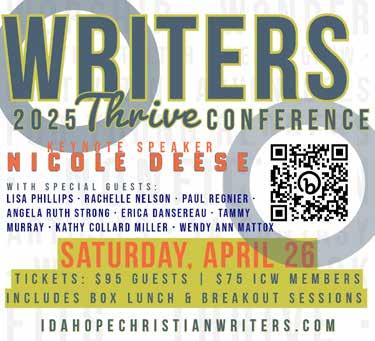
By Tom Claycomb III
I recently had a unique hunt. Charles Allen, owner of Knives of Alaska, called and invited Ron Spomer and myself to come down to his ranch and do some deer, hog and duck hunting. Then on top of these three hunts we were also going to squirrel hunt. There’s a lot of thick timber in east Texas and Charles told us that he had primo squirrel hunting. There are multiple methods to hunt squirrels, but the best/most fun way is how Charles had us hunt. We’d split up and meet a few hours later at a designated spot. He advised us to move along super slow and then set in a likely spot for 20 minutes to let the squirrels come out. The mature trees had rotted out hollows for them to live in. I’d hit my squirrel call to prompt them to stick their head out to see what was going on in the neighborhood.
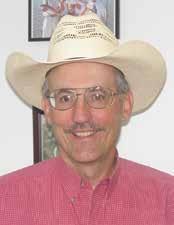
A lot of times we’d see them on the ground feeding or scampering in a tree. We’d then try to sneak in for a shot, but a high percentage of the time they … well, acted like squirrels and twirled around limbs, never holding still. When they stopped for a millisecond, you had to be ready.
Hunting in pairs is beneficial. Squirrels will invariably climb around to the opposite side of the tree. In those instances, have your buddy noisily walk around the other side so the squirrel will crawl back around, allowing you a shot.
One day Besty did a YouTube interview of Charles. In the interview he advised parents to train up their kids to be good hunters by starting them on squirrel hunting. He went on to tell how the skills he learned as a kid squirrel hunting prepared him for later big game hunts. He learned to ‘still hunt’, be ready for a shot when the opportunity arose, etc. This is true for a lot of skills we learn as a kid. Be smart, use life’s lessons to teach your kids skills that will benefit them for the rest of their life.
Christian Tip #7: Do you ever feel like you don’t know how to pray? Do you even say the right words to touch the God of heaven? Last night I was feeling like this. Last week in our home group a few parents brought up their kids. So I said, “Why don’t we fast and pray for them?” At the same time our church gave us names of Israeli hostages to pray for.
With the above said, Katy and I were fasting/praying. I told Katy that sometimes before I can really pray, I have to remind myself who I’m praying to. I’ll ask myself who am I praying to? Some wimpy god? A god that can’t hear my prayers? No! I’m praying to the God Most High! The Creator of the ends of the Earth. The same God that made the majestic bugling bull elk. The same God that created the cutthroat trout that God that made the majestic bugling bull elk. The same God that created the cutthroat trout that shimmer up the swift mountain streams. The God that made the mountains and the awesome sunrises/sunsets. (All of the above he created out of nothing, mind you). God already knows His attributes; I just need to remind myself of who I’m praying to.


Then I’m ready to pray. I’m ready for warfare. But that night I didn’t feel like I knew the right words to say and what if I wasn’t even actually praying according to His will? So I read to Katy these three verses:
1. …one mediator between God and men, the man Christ Jesus (1 Timothy 2:5).
2. And if any man sin, we have an advocate with the Father, Jesus Christ the Righteous (1 John 2:5).
3. …for we know not what we should pray for as we ought: but the Spirit itself maketh intercession for us… (Romans 8:26).
Suddenly I saw the spiritual correlation with the above truths and something in my personal life.
When I first started writing I had an awesome editor: Vickie Holbrook. When I got off work early, I’d run down to the newspaper office and hang around with her. One day she said, “Tom, I’m about to edit your article; want to watch and see what I do?” and I pulled up a chair beside her.
She leaned over and said, “Does it get you upset when I edit your articles?” She leaned in close and said, “It does, doesn’t it?” She then leaned back in her chair and shared some sage, old editor advice. “Tom, what I do is to remove anything that will distract/confuse your message. I’m the picture frame on your article. The picture is the star of the show. You don’t want a priceless picture in a shoddy frame. I won’t steal your voice. My job is to make you shine.” I’ve since valued good editors.
I suddenly saw the spiritual correlation. Scripture teaches us that Jesus is my Advocate. My Mediator. The Holy Spirit is making intercession for me, praying on my behalf for things I don’t even know I need. I don’t need to worry if my words aren’t perfect. I’m thinking Jesus deletes out what shouldn’t be in my prayers. He rearranges it in the correct format before it is presented to God. Jesus is my Prayer Editor and the Holy Spirit adds in what’s needed. Now when I pray I just pour out my heart and let my Personal Prayer Editor reformulate everything to perfection – and the Holy Spirit throws in what I missed.
PS: A few weeks later one of the hostages we were praying for got released. I’ve got a pretty good Prayer Editor. n
For more information about anything in this column, contact Tom at tomclaycomb3rd@gmail.com.


















By Daniel Bobinski
Let’s be honest. When you’ve been deeply hurt, slandered, or treated unjustly by someone, the last thing you want to do is pray for that person’s wellbeing. For me, if I let my human desires take over, my first instinct is vindication. I may even want that person to suffer for the pain they caused me.
This can be especially tempting if I hold information that could ruin that person. If I’m operating only with my earthly nature, the temptation to use that information – to exact revenge for the pain inflicted on me – can be overwhelming. Yet, Scripture commands a different response: “Do not repay evil with evil or insult with insult. On the contrary, repay evil with blessing” (see 1 Peter 3:9).
We also have the words from Jesus Himself. In Matthew 5:44, He couldn’t be more clear: “Love your enemies, bless those who curse you, do good to those who hate you, and pray for those who spitefully use you and persecute you.”

What we’re talking about here is forgiveness, and Jesus didn’t just suggest it, He mandated it. In fact, when asked how many time we should forgive, Jesus said, “Seventy times seven” (see Matthew 18:22).
I don’t believe for a moment that Jesus meant we can stop forgiving after we’ve done it 490 times. I believe He was saying we need to keep forgiving. After all, in Matthew 6 Jesus again was quite clear: “If you forgive other people when they sin against you, your heavenly Father will also forgive you. But if you do not forgive other people when they sin against you, your Heavenly Father will not forgive your sins” (vs. 14 and 15).
The Challenge of Forgiveness: I once spoke with a woman who was treated most unfairly at work. Punishments were being handed down for something that went wrong, and this woman found herself among several who were wrongly accused. After the manager would not listen to reason, this woman’s first reaction was anger and resentment. She wanted justice. But as she wrestled with these emotions, God impressed upon her heart a simple command: forgive and bless.
She didn’t want to do it, but through gritted teeth she obeyed and prayed. And the more she forgave and blessed the person who wronged her, the more her bitterness lifted. Anger dissipated, her heart softened, and before long, she genuinely wanted the best for her manager.
In that newfound peace, she felt in tune with God. She said it was like she was walking in perfect step with the Holy Spirit. So she kept the attitude of forgiveness and she continued to pray blessings on her manager. And, after a while, the woman’s integrity was noticed and she received a promotion.
Why We Struggle to Love Others: As humans, we rarely see the spiritual battles around us. When we’re hurt, the enemy often whispers, “You have every right to be angry. You deserve justice!”

What that enemy won’t tell you is that when we refuse to forgive, we chain ourselves to the pain. In truth, we have a choice. We can cling to resentment or walk in freedom.
Another reason I think we struggle to love others is because we can’t love like God does. The Bible says our human righteousness is as “filthy rags” (Isaiah 64:6), meaning even our best efforts fall short. So how can we love as God commands us? We can’t. At least, not alone. Only God’s love flowing through us makes true love and forgiveness possible.
That said, the truth is we all carry wounds from the past, and if left unhealed, these wounds shape how we interact with others. In other words, fear, rejection, or betrayal cause us to inadvertently project pain onto those around us. This is true of us as well as the people who hurt us.
The Prayer That Frees You: So what’s the solution? Simply stated, take it to God. We need healing, and so do the people who hurt us. For ourselves, we can ask God to reveal the fears that are shaping our actions and reactions. This process can be difficult, because acknowledging past wounds often brings back pain, but it’s necessary. Our healing begins when we invite God into those broken places.
One of the most impactful prayers I’ve prayed was asking God to remove the bitterness that had taken root in me. Some of it started growing in childhood, and other roots were growing from recent wounds. But the writer of Hebrews tells us, “See to it that no one falls short of the grace of God and that no bitterness grows up to cause trouble and defile many” (Hebrews 12:15).
With that, I prayed, “Lord, I pull out these roots of bitterness from my heart and I nail them to the cross. Burn them with Your holy fire. Wash the ashes away with Your blood. And also, because those roots caused cracks in my heart, I ask You to fill those cracks with your bold, healing blood.”
Then comes the hard part – obeying Matthew 5:44. We pray for those who’ve wronged us. We ask God to bless and heal them, just as He heals us.
Is it easy? Not always, but with each prayer it gets easier. At first, they might be just words for me, but in time, those words move from my head to my heart.
In time, as I forgive and bless those who hurt me, the desire for revenge goes away and it’s replaced by God’s peace.
It works. Try it. n
Daniel Bobinski, Th.D., is an award-winning and best-selling author and a popular speaker at conferences and retreats. Reach him at danielbobinski@protonmail.com or (208) 649-6400.





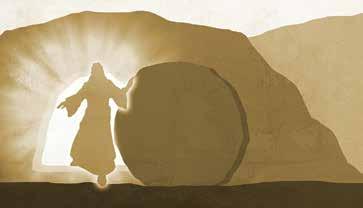
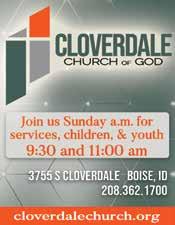
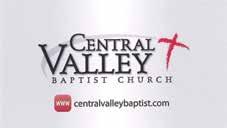
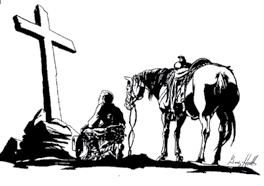

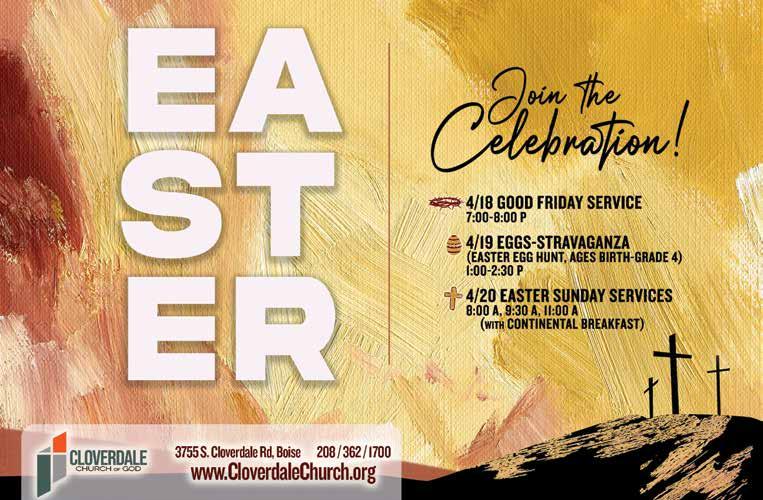
By Joan Endicott
On the first day of a marriage retreat, the speaker emphasized the importance of knowing what matters to each other. He pointed to a gentleman and asked, “For example, do you know your wife’s favorite flower?” With the enthusiasm of an 8-yearold answering a pop quiz, the husband proudly shouted, “Why, yes, I do!...Pillsbury All-Purpose!” The room erupted in laughter! And that’s perfect— since laughter is an essential ingredient in life and marriage.
Mark and I laugh a lot together every day—and the older we get, the more we have to laugh about! Our shared humor was one of the many things that initially attracted us to one another. As I write this, we’re celebrating our 45th Valentine’s Day as sweethearts. I love reminiscing about that first significant occasion—our very first Valentine’s Day. We had both gone to classes all day, and then I went to work, so it was later in the evening when we finally had the opportunity to declare our love and admiration (very Valentine-poetic, right?) for each other and exchange cards and gifts.
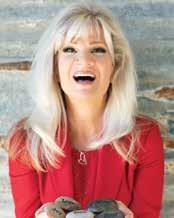
Before I share what Mark gave me, it’s important to know a little backstory. We weren’t talking marriage yet, but I had some friends from church who were jewelers, and I’d been learning a lot about the 4 C’s (cut, color, clarity, and carat) of diamonds. In casual conversations about my diamond discoveries, I mentioned to Mark that someday I wanted a 1-carat diamond.
So, when I opened the small jewelry-sized black velvet box, I was overjoyed—and immediately overcome with laughter when I saw the tiny tip of a fresh carrot! Fortunately (for him), the carrot sat atop some lovely gold earrings. And I really don’t want to come across as bragging, prideful or puffed up, but I’m happy to say that 45 years later, those earrings still fit me! (It’s possible Mark was subconsciously managing my expectations, knowing his future salary as a schoolteacher and coach!)
Just as we’ve asked those married longer than us, “What’s the key to enjoying a happy, healthy marriage?” we’re asked the same and get the opportunity to share our answer—whether at a marriage event or with the waitstaff at a restaurant. When we see someone who seems successful in a specific area, we all want to know their secret ingredients. That’s healthy. That’s wisdom. Scripture affirms the wisdom, benefit, and blessing of having a multitude of counselors—and also warns the prideful, haughty, and know-it-all fools who reap conflict, strife, and destruction when wisdom is not sought. Proverbs 11:14 (Amplified) reminds us: “Where there is no [wise, intelligent] guidance, the people fall [and go off course like a ship without a helm], but in the abundance of [wise and godly] counselors, there is victory.”
Listen, friend, this isn’t a finger-pointing, dart-throwing comment. I’ve been there more times than I’d like to admit when I thought I knew everything, only to discover I knew nothing! If I could go back to my younger years, I would very purposefully change that. At this age and stage of life, though, I want to continue to learn the value of being quick to listen and slow to speak whenever I have the irreplaceable opportunity to absorb insights and wisdom from older, wiser—and sometimes younger, wiser—people. It all depends on the depth of one’s knowledge and life experience. With younger/wiser, technology immediately comes to mind. LOL!
So, how do Mark and I answer the question when people ask about the secret to a happy, healthy marriage? Similar to how those wise mentors answer:
1. It starts with a shared faith. A strong foundation is paramount. The Bible implores us not to be unequally yoked, and nowhere is this more important than in a marriage relationship. It’s the foundation on which everything else is built. Anything built on a
shaky, unstable foundation cannot last. As Bible-believing, Jesus-loving Christians, Mark and I shared core values, priorities, and a life mission.
2. Faithful to God. Faithfulness to God influences our faithfulness in every area of life. Our love, commitment, and conviction in keeping the Lord first in our lives as individuals determine how we live in all our roles, responsibilities, and relationships. Decision-making is increasingly easier when values are clear.
3. Faithful to one another in all areas of life. Often, when one thinks of faithfulness, the physical aspect comes to mind. That’s where it may ultimately manifest, but unfaithfulness starts in the heart and mind long before the physical act of adultery defiles the marriage bed. “You have heard that it was said, ‘You shall not commit adultery.’ But I say to you that everyone who looks at a woman with lustful intent has already committed adultery with her in his heart.” —Matthew 5:27-28
Mental and emotional unfaithfulness is equally destructive. I’ve experienced firsthand the devastation of relationships when a woman walks into the world of fantasy. Feeding fantasies about being in different places with different people, marinating the mind in vain imaginations with “what if” and “if only” scenarios is not only dangerous and destructive to the mate but to everyone involved. I know—my mom did that.
The term faithful can be defined as demonstrating strong loyalty and steadfastness, especially in relationships or commitments. It implies being reliable, trustworthy, and true to one’s word. For instance, a faithful friend is someone who consistently supports and stands by you, no matter the circumstances. Similarly, a faithful partner in a relationship remains loyal and committed. The concept can also extend to beliefs or causes, where being faithful means adhering to and upholding one’s convictions or principles without wavering.
7 virtues that stem from being faithful:
1. Trustworthiness – Being reliable and dependable, earning the confidence of others
2. Loyalty – Maintaining steadfast devotion and support in relationships and commitments
3. Integrity – Adhering to moral and ethical principles, ensuring honesty and uprightness
4. Perseverance – Demonstrating persistence and determination to stay committed despite challenges
5. Responsibility – Taking ownership of one’s duties and actions, showing accountability
6. Patience – Exhibiting endurance and calmness in the face of difficulties and delays
7. Humility – Recognizing one’s dependence upon God and others, fostering a spirit of gratitude
I remember Zig Ziglar, in his later years, offering an emotional challenge as he shared the benefits of working through the tumultuous times in marriage. He reminded the audience that our choices forever affect more people than we realize: our partner, children, grandchildren, great-grandchildren, and generations to come—not to mention the countless others impacted by one couple’s commitment. Zig added, “Will you look back on life and say, ‘I wish I had’ or ‘I’m glad I did’?”
Isn’t that a powerful question and perspective? It’s a matter of looking beyond our current struggles to where we want to be eventually while simultaneously renewing our original vows. We continue to witness the crisis of unfaithfulness, and our hearts break for all who thought they were getting a faithful mate but didn’t. Such indescribable grief for so many. I know my mom had hurts and heartaches that no one knew about. I also believe that, if given the opportunity, she would have made very different faith-filled decisions. When facing death, what and who matters in life becomes crystal clear. Those who’ve weathered the storms and stayed the course will tell you: Don’t drift. Stay anchored. It’s worth it!
Men, I want to tell you something very personal from my wounded, 5-year-old little girl heart because that’s the only heart I know. The physical and sexual abuse I experienced from boys and men traumatized me—they took things from me because of their sick, selfish, uncontrolled flesh. Please, never believe the devil’s destructive dialogue telling you that what you do behind closed doors isn’t hurting anyone else. That is a lie from the pit of hell! Just as David, thinking what he did was in secret, eventually confessed to Nathan, “I have sinned against the Lord,” acknowledging his wrongdoing, not just against Bathsheba and Uriah, but primarily against God. God forgave him, yes, but he still faced the consequences of his sin, which included the devastation of his baby’s death. Compromise is never worth the price it demands. Ever. If you need help, get it. Now!
God has used my Mark in immeasurable ways to help heal my little girl heart. Because of how he demonstrated faithfulness in his relationship to Christ before we were married, I had full confidence in his faithfulness to me in marriage—and still do. He continues to keep his heart faithful to Christ first. Like all choices, faithfulness isn’t a one-and-done deal. It’s choosing moment by moment, again and again, over and over, millions of times. Continued clarity of conviction is the critical component. We all need God’s supernatural power continually pouring over us. It is foolish futility to try fighting spiritual battles with fleshly efforts. We must continually rely on the Holy Spirit—our Comforter, Counselor, Advocate, and Guide—to win the wars within.
God, the Creator of heaven and earth, the One who gave us life, also gifted us the institution of marriage. In His grace and mercy,


His Word is a guidebook, an owner’s manual for how to live our lives—in abundance. I have come that they may have life and have it to the full. —John 10:10
While knowing what matters to your mate is important—like what your wife’s favorite flower or flour is—nothing matters more than knowing you are their one and only, the one they are fully faithful to.
A good name is more desirable than great riches; to be esteemed is better than silver or gold. —Proverbs 22:1 n
Enjoy your FREE copy of Joan Endicott’s “I Get To!”® book at www.JoanEndicott.com. Also, be one of the first to get her 2nd book,“I Get To!”® Own My Worth! Joan is an AwardWinning Keynote Speaker, Author and Coach whose coaching has reached over 30 countries. Find out more about her speaking and coaching here: www.JoanEndicott.com

By Gary Moore
“How are you doing?” If you’re like me, you probably get asked that question several times a week. “Busy” has become the predictable answer we give. After all, we’d be embarrassed to say, “Just coasting and taking it easy.” It’s as if “busy” has become a badge of honor. But maybe it’s a cry for help? The irony is that our schedules are the result of our own doing. We have built this life and have made the choices.
It’s not that we’re complaining when we say “busy”. We’re just being honest about our schedules that feel overwhelming, and to-do lists that never seem to end.
But not all couples choose their situation. For some, busyness is thrust upon them. There are special circumstances and unique seasons of life that require greater amounts of our time and attention beyond our control. But the net effect is the same whether busyness comes by our own choosing or through circumstances we can’t control. Busyness makes it extremely challenging to find time, energy, and attention for our spouse.
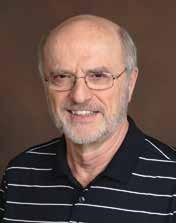
It takes a lot to manage our lives together. Busy couples usually aren’t intentionally rejecting their spouses or devaluing their relationships. They love their spouses and marriages. But over time they’ve created overflowing plates and can’t figure out how to make room for each other.
What about you? Do you feel like two ships passing in the night? Does it seem like your schedules are totally out-of-sync? Has spending quality time together fallen to the bottom of your to-do list?
According to Dr. Greg Smalley, author and vice president of Marriage and Family Formation at Focus on the Family, the problem with busyness is twofold. First, busy people are spread thin and feel physically worn out and emotionally depleted. Second, busy couples are disconnected.
The real threat is letting your connection slip away. The lifeblood of marriage, the indispensable factor that gives something its strength and vitality, is connection and deep intimacy – knowing and being known at the deepest levels. Busyness hijacks connection and ushers in disengagement. This emotional and physical distance leads spouses to feel anxious and unsafe, and they slowly start to isolate from each other and withdraw from the relationship. It’s what marriage expert Dr. John Gottman calls “the distance and isolation cascade.”
Love requires connection and time together. Many couples believe that their love will carry them through the busyness – that they’ll reconnect when the kids are older or when things slow down. The problem is that you both are constantly changing; and many couples discover that after the kids are gone, they are now living with a stranger. We can’t put our relationship on hold during a busy season or when our plates are overflowing.
Marriage doesn’t come with an autopilot or cruise control setting that allows us to simply push a button and attend to other obligations while our car drives down the
road unattended – and still experience a thriving relationship. A marriage can’t function like that. We must regularly invest in our marriage if we want to grow closer to each other.
Certainly, you didn’t stand before God and your friends on your wedding day and look deeply into your fiancé’s eyes and imagine that words like settling, maintaining, adequate, and good enough would describe your marriage one day.
When couples realize that busyness is killing their connection, they often cope with the inattention by focusing on the next “big thing.” They believe that their relationship can exist from one big thing to the next – from date night to date night, from holiday to holiday, or from vacation to vacation. They want these encounters to be “perfect” and want their hopes of connection, intimacy, fun, and enjoyment to come true. However, they end up putting too much pressure on these experiences to compensate for months or years of neglect. Our expectations for these events often set us up for failure. A few hours or days of being together cannot erase a year’s (or decade’s) worth of disconnection, neglect, conflict, and hurt. It just doesn’t work.
Couples are often given solutions like the following to manage busyness and disconnection: Slow down. Do less. Create margin. Simplify your life. Re-evaluate what’s on your plate. Set better boundaries. Give yourself permission to say no. Delegate and be willing to let go. Plan your week. Schedule your calendars together. And many others.
It’s not that these ideas and others are wrong or ineffective. Instead, these solutions often create what Dr. Smalley calls a yo-yo effect for couples. They can provide an initial connection but are unsuccessful in maintaining a long-term bond. Disconnection slowly creeps back in, and the guilt returns in full force. People end up feeling failed and discouraged.
The key lays in what Dr. Gottman simply calls ‘bids for connection’ – micro moments of connection. It’s the daily, little things that count the most. I’ll talk more about what these are and how they work in our next column. Until then, connect first. Communicate later. n

Gary Moore served as associate pastor at Cloverdale Church of God for 15 years. He does couples’ coaching and leads couples’ workshops and retreats called MUM’s the Word. He has a weekly radio program –Life Point Plus – on KBXL 94.1FM at 8:45 a.m. on Fridays. His website at www.mutualunderstanding. net has video teachings and other resources for couples. He may be contacted at glmoore113@gmail.com.


By Rosie Main
The human heart is a remarkable organ, tirelessly pumping life through our veins. However, in today’s fast-paced world, heart disease, fatigue, and metabolic disorders are becoming increasingly common. The key to a strong and vibrant heart isn’t just about avoiding disease — it’s about optimizing energy at the cellular level. This begins with supporting the mitochondria, the tiny powerhouses within our cells responsible for energy production. When we nurture our mitochondria, we promote heart health, increase endurance, and enhance overall vitality. By optimizing mitochondrial health, we enhance the body’s ability to produce clean energy, improve endurance, and protect the heart from premature aging and disease.
1. Nourish Your Heart with Mitochondria-Boosting Nutrition: What we eat directly impacts mitochondrial function. The heart is the most energy-demanding organ in the body, relying heavily on nutrient-dense foods to sustain its function. Here’s how to fuel your mitochondria for peak heart performance:

• Prioritize Healthy Fats: The mitochondria thrive on clean energy sources, and healthy fats provide a steady supply. Include avocados, wild-caught fish, coconut oil, olive oil, and grass-fed butter to fuel mitochondrial efficiency.
• Eat Antioxidant-Rich Foods: Oxidative stress damages mitochondria, leading to premature aging and reduced heart function. Load your plate with berries, leafy greens, cruciferous vegetables, turmeric, and dark chocolate to neutralize free radicals.
• Reduce Sugar and Processed Foods: Refined sugars and processed foods spike blood sugar levels, leading to inflammation and mitochondrial dysfunction. Instead, opt for whole, unprocessed foods to maintain stable energy levels.
• Support Cellular Function with CoQ10: This vital antioxidant is crucial for mitochondrial energy production and heart function. Found in grass-fed meats, organ meats, and fatty fish, CoQ10 keeps your heart running efficiently.
2. Move Your Body to Strengthen the Heart and Mitochondria: Exercise isn’t just about staying fit – it’s one of the most powerful ways to enhance mitochondrial function and cardiovascular health. Movement stimulates mitochondrial biogenesis, meaning your body actually creates more energy-producing mitochondria. Here’s how to optimize heart health through movement:
• Incorporate Aerobic Exercise: Activities like brisk walking, jogging, swimming, and cycling improve heart strength and oxygen efficiency, boosting mitochondrial function. Aim for at least 30 minutes, five days a week.
• Use High-Intensity Interval Training (HIIT): Short bursts of intense exercise followed by rest periods significantly increase mitochondrial production. A simple HIIT workout could include 20 seconds of sprinting, followed by 40 seconds of walking, repeated for 10–15 minutes.
• Strength Training for Longevity: Lifting weights or engaging in bodyweight exercises (like push-ups, squats, and lunges) improves muscle strength, metabolism, and overall mitochondrial health.
3. Supplement Wisely for Optimal Heart Energy: While proper nutrition lays the foundation, targeted supplementation can further support mitochondrial function and heart health:
• Coenzyme Q10 (CoQ10): As mentioned earlier, this antioxidant plays a vital role in energy production. Supplementing with



100-200 mg per day can enhance heart efficiency.
• Magnesium: This mineral is essential for heart rhythm and mitochondrial function. Magnesium glycinate or citrate (300-400 mg per day) can help reduce inflammation and improve energy.
• Omega-3 Fatty Acids: Found in fish oil or krill oil supplements, omega-3s support heart function by reducing inflammation and improving mitochondrial efficiency.
• L-Carnitine: This amino acid helps transport fatty acids into the mitochondria to be burned as energy. Supplementing with 500-1000 mg per day may enhance endurance and heart function.

Your Heart, Your Power Source: Caring for your heart is more than just avoiding disease. It’s about thriving with abundant energy and strength. By nourishing your body with the right foods, moving daily, and supporting mitochondrial function with key supplements, you can create a foundation for lifelong heart health. Take action today, and empower your heart to beat with purpose, vitality, and endurance for years to come. n
For further support with your health goals or more information, go to MainHealthSolutions.com
• 1 cup unsweetened almond milk (or coconut milk for healthy fats)
• ½ avocado (rich in heart-healthy monounsaturated fats)
• ½ cup frozen organic blueberries (powerful antioxidants for reducing oxidative stress)
• 1 Tbsp chia seeds or flaxseeds (omega-3s for reducing inflammation)
• ½ tsp turmeric (anti-inflammatory and heart-protective)
• ½ tsp cinnamon (helps regulate blood sugar levels)
• 1 Tbsp raw cacao powder (rich in magnesium for heart rhythm support)
• 1 scoop collagen or plant-based protein powder (supports muscle and heart function)
• ½ tsp pure vanilla extract (for flavor and antioxidants)
• ½ - 1 cup filtered water or ice (adjust for desired consistency)
Optional Super Boosters:
• 1 tsp MCT oil or coconut oil (for extra mitochondrial fuel)
• ½ tsp L-carnitine powder (if using supplements to boost energy production)
1. Blend all ingredients in a high-speed blender until smooth and creamy.
2. Pour into a glass and enjoy this power-packed, heart-loving smoothie.
This smoothie provides healthy fats, antioxidants, omega-3s, and essential vitamins to nourish mitochondria, lower inflammation, and keep your heart strong. Plus, it tastes amazing.
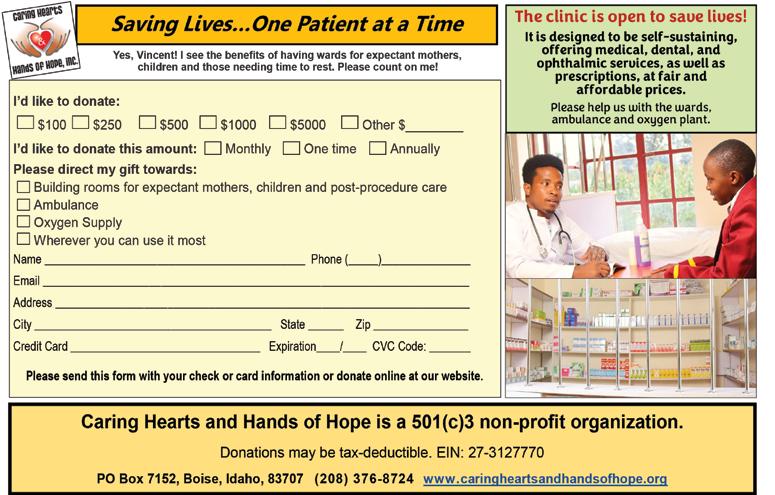

“God
owns the cattle on a thousand hills, and I’m asking Him to sell them.”
– Vincent Kituku, founder of Caring Hearts and Hands of Hope
By Gaye Bunderson
Vincent Kituku of Eagle accomplished so much for his native land of Kenya. But he credits God – and the generosity of His caring people – for all he’s been able to do. “I am shocked for what God has done,” he said.
Kituku, who knows that the only lifeline from poverty for vulnerable children is education, helped establish two boarding high school facilities – one for girls in 2015 and one for boys in 2020 – 60 miles east of Nairobi, Kenya, under the umbrella of a non-profit, Caring Hearts and Hands of Hope that he founded in 2010. The organization is sponsoring 964 students – 685 in high school and 279 in university and vocational training institutions.
But his father’s death in deplorable hospital conditions in Kangundo, Kenya moved him to want to found a clinic with modern medicine, equipment, and treatments that Kenyans could access for safer healthcare. His father died at age 89 on May 16, 2022, from complications of diabetes and blood pressure. Kituku listed the extreme substandard conditions he saw at the hospital where his father experienced his final days: “Patients were left unattended and neglected; there were no gloves, no saline, no IV. The hospital had no medicine; patients had to go to the pharmacy, buy it, and give it to the hospital.”
He went on to say, “There was no water for flushing toilets and no backup electricity. In Kenya, a blackout is more predictable than birth and death. I witnessed patients being imprisoned in the hospital after they were discharged but couldn’t pay for their treatment. They had to remain there, incurring more charges until their poor families could raise the money and pay.”
He started moving family members, students and employees of the two schools, and other people to other hospitals. “I had to take my mother away from getting treatment there,” he said.
He tried to help the hospital by purchasing a washer and dryer and oxygen concentrator, repairing a generator, and stocking medicines. He also paid $20 a day for clean water to be delivered at the hospital from Caring Hearts High SchoolKangundo, the boys’ school which is one mile from the hospital.
His next attempt at fixing the problem was to ask if he could run the rundown healthcare facility and keep everybody accountable. That did not work out.
“The conditions at the hospital depressed and affected me more than my father’s passing,” Kituku said. What was he to do next?
“One day in May in 2023 I was praying; and while praying, I see there is a piece of land next to the boys’ high school that would be good for a clinic. It was a house with five bedrooms and four single-room apartments for employees, and it came on the market.”
Caring Hearts and Hands of Hope donors bought it in April 2024 and took possession on June 15. Renovation started immediately. “I designed the clinic completely – and the schools too,” Kituku stated. Employees of the organization in Kenya email photos and updates daily. He said: “From the photos, I can tell when a column is in the wrong place.”
The clinic opened December 3, 2024, and is called Ngoo Sya Wendo, or Hearts of Love. As of late December, 2024, it had 10 rooms and included an ultrasound scanner, X-ray machines, a fully stocked pharmacy, optometry and dental care center, a lab with four technicians, triage, records keeping, and a theater for minor surgery.

Regarding the equipment and medicines he is getting for the clinic, he said he works with ophthalmologists, pharmacists, dentists, lab technicians, medical doctors, nurses and others to tell him what is needed, and then he gets a quote.
He fundraised to help finance the life-saving healthcare center. “I raised money for renovation, medical equipment and supplies; 95% of the money comes from Idaho – mainly from the Treasure Valley, but from other communities as well, such as Payette, McCall, Sun Valley area, Twin Falls and Mountain Home.”
He also receives donations from people in other states, including Ohio, Arizona, California, Washington, Tennessee, Hawaii – “most of the states,” he said.
When asked how people know about his work in Kenya, he said it is from his career as a motivational speaker and writer for many years. “God was preparing me for this without my knowing.”
Kituku emigrated from Kenya to Wyoming (where he said he picked up his accent) in 1986 to attend a graduate school but also to escape political persecution of the Moi government. He moved his family to Idaho in 1992 and applied for asylum in 1994. He has four grown children – three daughters and a son –and his wife, Theresia, owns a Boise daycare center for children called Born to Succeed on McMillan. “Theresia is my natural advisory board member. But we have amazing board members,” said Kituku.
Once the clinic opened, the healthcare experts realized some unexpected needs. That included patients who need to be stabilized for 24 hours for close observation – thus the need for a small in-patient ward as well as an ambulance that has functional medical equipment and supplies for emergency care. The ward project and ambulance are estimated to cost about $279,000.
Vincent is eternally grateful for any amount donated. He believes “a lot of small dollars do go a long way in saving and/or transforming lives.” Many of the contributions the organization receives are modest in size – and, again, he is eternally thankful for them.
Regarding who is running the clinic and schools when he is not there, he said: “In the Bible, God used people with a lot of problems to change the world,” and that is what he is doing too – using regular people to run things in his absence. They stay in constant touch with him; and many of the people who ‘man’ the clinic are graduates of his boys’ and girls’ schools who are grateful for their education and for the opportunity to contribute to the betterment of their homeland.
Kituku explained: “More than 50 percent of the people working at the clinic are from poverty-stricken families.” They are familiar with hardship, but Kituku provided them with opportunity.
At age 67, Kituku claimed that he wants to slow down. Asked if he is proud of all he has accomplished, he replied: “I’m humbled by what God can do. When I say you can change the world, I mean it: one poor child at a time.”
His efforts in educating the young Kenyan population now extends to those in the country who cannot obtain reasonable healthcare when they are sick. If anyone can change that, it will be Vincent Kituku, his supporters, and his contributors. With the help of God of course. n
For more information, go to www.caringheartsandhandsofhope.org or contact Vincent Kituku at vincent@kituku.com.
By Dr. Rick Chromey
America the beautiful...and heroic.
In 19th-century schoolhouses, children learned our nation’s history through tales of heroes like George Washington’s Delaware crossing or Paul Revere’s midnight ride.
However, Meriwether Lewis and William Clark – America’s courageous explorers of the West –proved the greatest “rock stars” of their era.
They achieved the impossible –an accomplishment greater than developing an atomic bomb or landing on the moon. Lacking maps or guides, and receiving occasional help from native tribes, Lewis and Clark journeyed 8,000 miles, primarily through uncharted wilderness, to the Pacific Ocean and back.
Lewis and Clark pointed their noses West...in “confident hope.” 1
Thomas Jefferson named them the “Corps of Discovery,” though they could easily have been the “Corpse of Discovery.” Survival proved a daily battle for this party of young men who served as French interpreters, rivermen, military conscripts, and frontiersmen. Also among them were a teenage Shoshone wife with her newborn son, Clark’s Black servant, and Lewis’s Newfoundland dog.

Clark finally gave his answer when he informed one adoring group that their achievement wasn’t fueled by luck, fate, or the captain’s “wisdom.” Rather, Clark credited God’s “singular interposition of Providence.” 4
The Almighty intervened, Clark believed, to rescue and heal, provide and protect their military mission.
Captains Lewis and Clark, Sergeants Ordway, Gass, Floyd, and Private Whitehouse documented this expedition in their journals. These military journals primarily focused on understanding geography, nature, people, and culture.
It’s why we know little about the party’s personal lives or their religious values, denominational loyalties, and spiritual behaviors. Such activities weren’t central to their mission. Nevertheless, the era’s cultural contexts and America’s religious dispositions are helpful, if we pay attention.
At the turn of the 19th century, America was deeply religious. Despite claims of Founding Father agnosticism, Deism, or atheism, evidence of nonbelief is scarce. Americans weren’t divided by belief in God but rather by denominationalism.
For nearly two and half years, the Corps of Discovery survived starvation, drownings, illness, and disease. They endured subzero temperatures, soaking rains, and flash floods. The Corps was plagued by mosquitoes, rattled by snakes, surprised by grizzlies, and charged by bison. Various members outlived falls off cliffs, gunshot accidents, wildfires, sandstorms, capsized canoes, and hostile encounters with the Teton and Blackfeet.
They endured weeks of grueling travel through the Bitterroot Mountains in Idaho’s panhandle. Almost every member of the Corps was either ill, frostbitten, or battling hypothermia. All of them were facing starvation.
Four months earlier, the party enjoyed ample meat, but now hunters returned with only a few grouse and squirrels, insufficient to satisfy their hunger. Sgt. Patrick Gass journaled that “without a miracle,” it would be “impossible” to feed their party.2 The term “miracle” appears only once in the journals despite several miraculous moments.
It was a miracle only one man (Sgt. Charles Floyd) died on the expedition, and from a death unrelated to the Trail’s perils.3 It was a miracle Lewis escaped a fall off a 300-foot cliff. Or Sacagawea was miraculously healed from her deathbed illness...by sulfur water coincidentally found nearby.
After their return, the captains were often asked how they accomplished it.
Colonies were founded by religious groups, eventually giving each state a distinct denominational flavor (except Pennsylvania). The home state revealed religious loyalties. Lewis and Clark were Virginians from Anglican (Episcopalian) families. Sgt. Ordway, from New Hampshire, was probably Congregationalist, while Pennsylvanian Sgt. Gass was either Quaker, Mennonite, or Lutheran.
In the early 1800s, Americans embraced a “Second Great Awakening” that populated churches and packed revival camps. Lewis’s mother converted to a fiery form of Methodism that practiced extreme “holiness.” Thomas Jefferson and Meriwether Lewis were regular worshippers at the U.S. Capitol church.
In 1785, William Clark’s family relocated to Kentucky, a popular region for over 250,000 Scotch-Irish Presbyterians in the 1700s. Unlike Clark’s Anglican faith, which valued tolerance and liberty, these new settlers embraced a strong, energetic religious fervor, often walking miles to church “to become good Christians.” 5
After the expedition, Clark’s promotion of religion and Anglicanism became more apparent. In 1814, he invited a Roman Catholic priest to baptize his three oldest children and later helped build St. Louis’s first Protestant Episcopal church.
Despite Lewis’s infrequent church attendance after the expedition, he still professed belief in God, if only through his documented Masonic rituals. 6
Essentially, Lewis and Clark and their recruits were young American Protestants from various denominations. The rest of their hires were likely French Roman Catholics, including Toussaint Charbonneau and Sacagawea. 7
Unlike today, there were few atheists, Muslims, or Jews in America. Consequently, in colonial and postRevolutionary America, Christianity was the dominant faith, with each state legislating a denominational position.
Occasionally, challenges to the concept of a “Christian America” arose, including some cases to the highest court, but the evidence was clear. In 1854, a U.S. House judiciary committee conducted a thorough study to answer skepticism about the nation’s religious roots and concluded:
“In this age, there can be no substitute for Christianity…That was the religion of the founders of the republic and they expected it to remain the religion of their descendants.” 8
This was the historical religious culture and context of Lewis and Clark.
With God’s help, they conquered a continent and became heroes.
Believe it or not. n
Dr. Rick Chromey is an author, historian and theologian who speaks and writes on matters of religion, culture, history, technology and leadership. He’s the founder and president of MANNA! Educational Services International. Rick and his wife Linda live in Star, ID. www.mannasolutions.org
Sources:
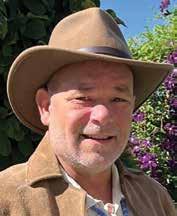
1. Meriwether Lewis journaled as the party departed their Mandan winter camp: “...the picture which now presented itself to me was a most pleasing one...entertaining (now) as I do, the most confident hope of succeeding in a voyage which had formed a da[r]ling project of mine for the last ten years (of my life)...” Gary Moulton, The Definitive Journals of Lewis and Clark (7-Volumes). Meriwether Lewis: April 7, 1805. Accessed online: https://lewisandclarkjournals.unl.edu/item/lc.jrn.1805-04-07
2. Moulton, Journals of Lewis and Clark, Patrick Gass: September 14, 1805. Accessed online: https://lewisandclarkjournals.unl.edu/item/lc.jrn.1805-09-14#lc.jrn.1805-09-14.04
3. Sgt. Charles Floyd died August 20, 1804 “with a great deal of composure” (Clark), most likely due to a ruptured appendix. For more information: https://lewis-clark.org/day-by-day/20aug-1804/
4. “Clark to the Citizens of Fincastle,” January 8, 1807, Letters of the Lewis & Clark Expedition with Related Documents, 1783–1806, ed. Donald Jackson (Urbana, IL: University of Illinois Press, 1978), 359–60.
5. James H. Hutson, Religion and the Founding of the American Republic (Washington, D.C.: Library of Congress, 1998): 22.
6. Meriwether Lewis joined the Ancient Free and Accepted Masons on January 28, 1797. He’d reach the third degree of “Master Mason” on his second night, literally “promoted ‘at sight’... by unanimous ballot.” Two and a half years later, he was “exalted” to the Royal Arch degree in the York Rite. Lewis’s Masonic apron is still viewable at Helena, Montana’s Grand Lodge. “Lewis as Master Mason” by Joseph A. Mussulman: https://lewis-clark.org/members/meriwether-lewis/lewis-as-master-mason/
7. It was not uncommon for American Indian wives of white European men to adopt their husbands’ religions. Native beliefs are openly tolerant and adaptable, which is why Western Indian tribes viewed Christianity as something that could enhance rather than replace their native religions. Both Charbonneau and Sacagawea’s Catholic beliefs were evident after the Expedition when they took their young son, Jean Baptiste, and baptized him Roman Catholic during their first visit to St. Louis. 8. Reports of Committees of the House of Representatives Made During the First Session of the Thirty-Third Congress (Washington: A. O. P. Nicholson, 1854), 6-9.
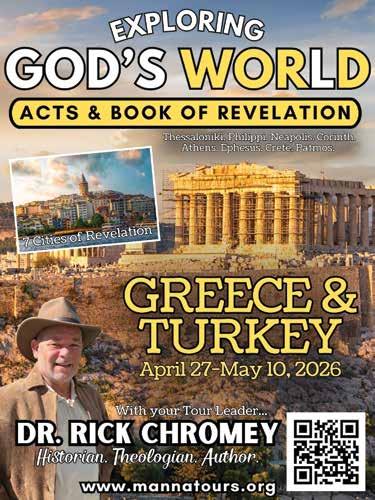
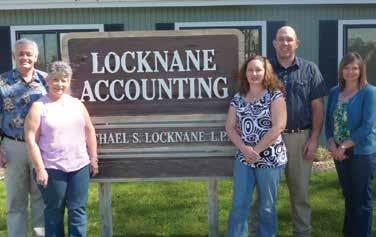

By Steve Bertel
Editor’s note: This is the first installment of a two-part article.
We’ve all watched those television shows where carpentry crews take on major home renovation projects, bashing through stucco walls with their sledgehammers, ripping out old linoleum, tearing away decayed shingles, even pulling antiquated wallpaper off the walls. Replacing the old with the new.
That’s the way it was in Wayne Craig’s life.
Only God was the carpenter.
Wayne grew up in rural southern Ada County with his parents, one brother, and two sisters. He admits they were a typical lukewarm Christian family. “My parents were believers, but we went to church only about six or seven times a year –enough for me to understand there was a God out there, and that some guy by the name of Jesus apparently walked around on this Earth a long time ago, did some miracles, died on a cross, and apparently woke up a few days later. So yes, I was checking the box a few Sundays a year so I could ‘identify’ as a Christian.”
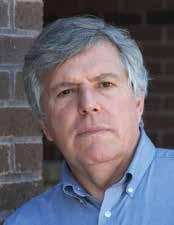
Like many kids his age in the area, Wayne attended school in nearby Kuna. That’s where he met Jaymi, the girl who would later become his wife. But they were both quite young; he was a burly sophomore; she was still in junior high.
They were madly in love, but “We decided to not follow God’s perfect design for marriage,” he says. “That was in 1989. Shortly thereafter, we had our first child. I was 18, Jaymi was only 15. So I was married, had a wife and a newborn baby at home, and was working three part-time jobs to support them, even before I graduated high school.”
“Fortunately, even though I was not really following the Lord at that time, He blessed our marriage and protected us through some pretty hard times,” he adds. This year, the couple will be celebrating their 35th wedding anniversary.
The “hard times” were more than the average challenges typically facing a young, newly-married couple. Including his walk with the Lord. Wayne and his father were running an electrical contracting business at the time, the family business his father had started. And Wayne was enjoying life. “I felt the Lord calling me for quite a while. But I dug my feet in. I loved the world. I loved my business. I loved my hobbies. I loved everything materialistic. And I justified working six to seven days a week, ten to twelve hours a day, to provide for my family. So I didn’t have time for the Lord,” he admits. “But He just kept tugging on my heart. I knew what I needed to do. But I didn’t want to get off that fence; I didn’t want to make that commitment and give my life to Him. I felt I could continue to ride that fence line, so to speak, with one foot on and one foot off.”
His wife had been raised in an LDS home. In fact, many members of her family had followed the Mormon faith for several generations. But then, in 1995, Jaymi walked away from that faith. She later accepted Jesus Christ as her Lord and Savior and started attending other churches. “Her courage and strength to walk her own walk and pursue Jesus and the Father had nothing to do with me,” Wayne points out. “It was her own personal journey with God. I was not the spiritual leader of the family back then, as I should have been. Today, I tell people my wife drug me kicking and screaming into church, because she was a believer way before me.”
“God meant men to be the spiritual leaders of their families. And when we’re not, we create a void of sorts,” he goes on. “Looking back, it’s amazing how God will use our wives to grab us men by the ears to get our attention.”
The couple “bounced around” between several churches in the area as Jaymi continued to encourage her husband to follow the
Lord. As time went on, Wayne says, “I felt more and more that I had to get myself right with God; I had to go down the right path. Watching Jaymi go through her journey sort of nudged me into deciding to start taking things seriously.”
Wayne finally took things seriously on April 4, 1999, when he gave his heart to the Lord during an altar call at a little country church in Eagle, the same church his parents had attended. It was a special day for Wayne. Times three. “It was Easter. It was my wife’s birthday. And it was the day I told myself, ‘All right. It’s time to get off the fence’. So that’s when I made the decision to go forward.”
But the going-forward experience wasn’t quite what he expected. “There was the pastor and a few men in the front of the church. I got a slap on the back and, even though they were happy for me, they said something like, ‘Here’s your Bible. Now go read it,’” Wayne recalls. That left him a bit empty –and wanting more. “That’s not what I needed. I felt I needed a man to come alongside me to mentor and disciple me.”
Of course, Wayne was unaware at the time that God was already working on that.
“Halfway through reading the Old Testament, I got lost and confused. I didn’t know what was going on,” he recalls. Eventually, “I was back to the ‘old’ me. I had stopped reading my Bible and slipped back into my old ways. But I believe God allowed this so I could understand the desperate need we have in the Body of Christ for mature Christian men to come alongside new believers, to mentor and disciple them. I didn’t have that at the time. So I struggled and, eventually, the world pulled me back.”
He adds, “I believe God could have provided a man to come alongside me. But again, I think He wanted me to go through that experience, so I could understand the incredible need we have within the body of Christ right now for men to step up, dedicate some time, and mentor baby Christians. I didn’t know it at the time, but He was preparing me for where He was going to call me.”
“When some men come forward in altar calls like that, they ‘get it.’ They go all-in for the Lord and get off the fence from that point on. But I didn’t. So the Lord had to hit me upside the head with a bigger two-by-four to help me get the point,” he chuckles.
That two-by-four came in December, 2007, when economies around the world began to decline. And things quickly went from bad to worse. A subprime mortgage crisis soon hit the United States. Housing prices fell, homeowners walked away from their mortgages, and banks – those that hadn’t already closed – were unable to provide loans to businesses.
With the economy in shambles, “Our family’s [electrical contracting] business, that once had more than forty employees, ground to a halt,” he recalls. “As I result, I lost everything. I lost our big beautiful home on ten acres. I lost my new, one-ton diesel truck. I lost all my ‘toys,’ my ATVs …” But, even though Wayne and his family hit rock bottom, “I was still riding the fence, still refusing to go ‘all-in’ for God and fully give my life to Him.”
One day, Wayne told his wife, “I can’t explain it, but I believe God wants me to go to North Dakota for a few years for work.” There was a job opportunity there, a way for him to earn money and put food on the table through the tough times. So he took it. The plan was: Jaymi and their children – they had a son and three daughters by then – would stay behind in Idaho, a plan that would allow their kids to graduate from high school with their friends. The couple figured the arrangement would last about two years. But, even though Wayne came home every so often, the separation from his wife and family became increasingly unbearable.
A year into it, “I hit my knees and cried out to the Lord, ‘I give up! I can’t take this anymore!’ I told Him I would do anything He asked
of me; that I would make any change He needed me to make, if only He would bring my family back to me,” he says.
Eventually, Wayne began attending a local church – the Evangelical Bible Church – in the North Dakota community where he lived. There, he met the church’s associate pastor, Ron Dazell, who became the mentor Wayne had so desperately craved. “Ron gave me a whole new perspective; he helped me better understand the Bible,” Wayne points out. “Even to where I felt more open about asking dumb questions.”
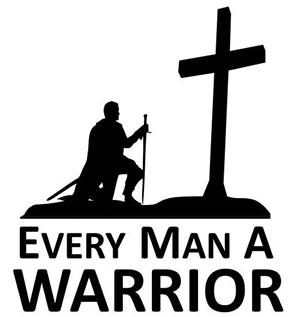
The two soon became close friends. So close that “One day, I said to him, ‘I’m so frustrated. I go to bed each night reading my Bible. In fact, I fall asleep reading it. The next morning, I wake up with it on my chest – and I don’t remember anything I read the night before! There must be something out there that can help me dig into God’s Word and retain it.’
“I remember Ron said to me, ‘As a matter of fact, I was thinking about starting a new men’s small group study called ‘Every Man A Warrior.’ Would you like to be in the pilot group?’
“I said, ‘Absolutely! I’ll try anything.’”
Every Man A Warrior is a Bible study that helps spiritually-mature men disciple others, especially new Christians. Its four-book study program, written by founder/president Lonnie Berger, teaches men how to walk closer with God, how to build a personal love relationship with Him, and how to conquer the typical daily battles men fight, all while teaching them the biblical foundations of how to be a godly husband and father, how to stay morally pure, how to find victory over sins they gave up trying to fight, and how to succeed in life

when they go on to teach the same truths to other men. At the time Wayne joined, the study program was in its infancy; by 2015, men in all fifty states and several countries were using EMAW; in 2017, the ministry joined TransWorld Radio, a worldwide Christian radio network; and by 2019, 80,000 men in sixty countries had been impacted by the EMAW curriculum.
Finally being mentored in his walk with the Lord made for what Wayne describes as “a radical transformation in my life. God used Ron to disciple me through the EMAW curriculum – which built skills and disciplines in my life on how to have a purposeful, lasting love relationship with God. It gave me the biblical template on how to be a godly husband and father. And it forced me to slow down and spend time with God in His Word and in prayer. The work He did in my heart changed me from the inside out.”
Five years after Wayne left Idaho, “God allowed me to be reunited with my bride,” as he puts it, when Jaymi – now an empty-nester – moved to North Dakota to join her husband. Being apart “was the hardest thing we have ever done,” he says. “It was a very, very difficult season of life for Jaymi and me, but we both came through it stronger and more in love with each other as a husband and wife.”
In the fall of 2018, Wayne told Pastor Ron that God had been calling him to “something more,” to serve Him in a greater capacity. “Ron began to help me and stretch me with more and more ministry work, including mentoring me through writing sermons, and practicing and helping to open doors in other areas for me to serve the body of Christ,” Wayne says.
Continued on page 27







By Ryan De Amicis
Ninety-six percent of adults admit they have an internal dialogue. But only one quarter of these self-proclaimed adults admit they talk to themselves out loud.
Hello, my name is Ryan De Amicis, and I am one of these adults who talks out loud to himself. I could be anywhere; most of the time, it’s at the grocery store and it’s an intense debate over whether I should buy Fred Meyer’s perfectly baked Private Selection White Chocolate Macadamia Nut Cookies.
Whether your dialogue with yourself is internal or external, we can harness this trait for good. Many of us want to make the best investment or financial decision available. If that’s you, you are in good company. Here’s questions we often come across: Should I be saving more? Will I run out of money? Should I be giving less? Should we buy that business? How about moving to a bigger home? Time to downsize? Should we splurge on the Telsa Cybertruck? (I mean it’s only $100K and we’ll save money on gas… okay… okay… that’s just my excuse.)
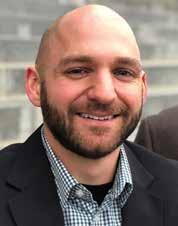
So, the next time you are contemplating a financial decision, consider starting a dialogue with yourself (or better yet with a loved one) by posing the following questions:
First, how will this financial decision increase my daily dependence on the provision of Jesus? While fear may motivate us to bury our treasure under the ground (Matthew 25:1430), greed can also influence us to store up as much as possible (Luke 12:13-21). I often find fear and greed present in my personal money decisions, and my continual petition to God is that I want Him, not things. Anyway, as we strive to make decisions that honor the Lord and prepare for the future, there is a call to contentment as we daily depend on the provision of God (Hebrews 13:5).
Second, how will this financial decision require us to trust in God? In the book of Malachi, God cries out to His people because of their faithlessness. The Israelites broke their covenant with God by “offering defiled food on [His] altar” and robbing Him of his tithes and offerings. The Lord challenges them to “Bring the whole tithe into the storehouse, that there may be food in my house. Test me in this … and see if I will not throw open the floodgates of heaven and pour out so much blessing that there will not be room enough to store it” (Malachi 3:10). Since God is trustworthy, do our financial decisions reveal our trust in Him?
Third, how does this financial decision increase our loyalty to God? You may have heard this: show me your calendar and your checkbook and I’ll tell you what you value. As we make monetary commitments, we are silently attesting to the things we value and, dare I say, what we are loyal to. Do I take out a loan for the Tesla Cybertruck? Do I buy the nicest house the bank will lend me money for? While I desire to have a nice home and car, may we consider a sign that we are loyal to God is the continued discovery of the joy of generosity. Jesus Himself said: “It is more blessed to give than to receive” (Acts 20:35b).
Lastly, how does this financial decision increase our ability to serve the people God has called us to? At the end of the day, money is a tool. Jesus reminds us, “[we] cannot serve both God and money” (Matthew 6:24). Where has God called you to minister? Who are the people God has called you to serve? Proverbs 4:26 states, “Ponder the path of your feet; then all your ways will be sure.” As Christians, we are stewards of God’s
resources. We would benefit from drawing near to Scripture and listening to the Holy Spirit’s prompting as we navigate through life’s challenging financial decisions.
I used to frequently buy cookies because eating a box of them comforted me after a stressful day. While I still find myself clinging to food for comfort, I’m discovering more joy out of depending on God to satisfy the desires of my heart than a box of cookies could ever touch. n
Ryan De Amicis is an investment advisor with Christian Wealth Management in Boise, providing biblically responsible investment advice to Christians. For more information, visit investforthegloryofgod.com or contact him at ryan@christianwm.com or (408) 758-6413. Investment advisory services provided by Creative Financial Designs, Inc., a Registered Investment Advisor. Securities are offered through CFD Investments, Inc., Member FINRA & SIPC. 2704 South Goyer Road, Kokomo, IN 46902, (795) 453-9600. Christian Wealth Management, LLC is not affiliated with CFD Investments, Inc. or Creative Financial Designs, Inc., a Registered Investment Advisor.
Steve Bertel
Fill in each answer, one letter per square. Then ar range t he letters in t he highlighted squares to reveal t he name of
AN
1. Hebrews reminds us that “ … faith is confidence in what we hope for and ___ about what we do not see.”
2. Jephunneh’s son
3. She said, “And if I per ish, I per ish.”
4. In an alphabetical listing of Bible Books, this precedes Philippians
And AN OLD TE STAMEN T DUO is … AND
Two years later, the couple sold their home, Wayne made the decision to close the doors of the family business – after celebrating its 40th year, and answer the Lord’s calling to serve full time with the Every Man A Warrior ministry. Later, EMAW founder Lonnie Berger approached him. “He had been watching the fruits of the ministry work for a year or so, and felt it was time for me to come on staff full-time with EMAW. After prayer and speaking with my bride, I accepted his offer.”
“In short, after a season of trials, hard times, and spiritual growth, God restored everything I had lost,” he says. “This was God allowing me to be torn down, so He could rebuild me, prepare me, and then launch me into this new calling and this new season of my life.”
Berger also asked Wayne to move back to Idaho and become the ministry’s Northwest Director for the United States. “The request to move back to Idaho was almost a deal breaker for us,” Wayne admits, “since we had come to love our church family in North Dakota so much and had grown deep roots there.”
But Wayne and Jaymi followed God’s prompting, returned to Idaho, and began developing the EMAW ministry in the Northwest, traveling to churches, assisting pastors, growing the ministry, and strengthening others.
Wayne believes, “Mentorship is lacking in churches today. After men give their lives to Christ, there’s usually no one to come alongside them, and guide them in their walk. Sixty, seventy, eighty years ago, the elderly men in a church used to mentor and disciple the young men. But that’s not done much today. Pastors try to do this, but there are simply not enough hours in the day for them to disciple men like this. Plus, pastors are pulled in so many different directions.

That’s where Every Man A Warrior comes in: to come alongside the men and equip them with the tools to mentor others … and on and on down the line.”
Giving credit where credit’s due, he states, “The Lord used the men and women at Evangelical Bible Church in North Dakota to mentor, disciple, and grow both Jaymi and me. Not only have they supported us financially, they launched us spiritually prepared, emotionally prepared, and full of confidence in this calling. To say God used and worked through this precious body of Christ is an understatement. I will be forever grateful for their investment into our lives.”
When he signed up and joined the Every Man A Warrior organization, Wayne knew God was orchestrating his steps. But what he didn’t realize at the time was that God was about to lead him into one of the most deadly and dangerous regions of the world. n
Be sure to read all about Wayne’s further experiences in our upcoming May/June issue. If you’re interested in learning more about the Every Man A Warrior men’s ministry, contact Wayne at wayne@everymanawarrior.com.
Steve Bertel is a multi-award-winning professional radio, television, print media, and social media journalist, who retired after a 30-year broadcasting career. Now a busy freelance writer, he recently released his debut suspense novel “Dolphins of an Unjust Sea”, available on both Amazon and Kindle. Steve and his wife of 42 years live in Meridian, Idaho. He can be reached at stevebertel65@gmail.com


By Bethany Riehl
(Editor’s note: Below is a fictionalized account of a familiar story from the New Testament, specifically from the book of Mark. The article is Part One of a series, and the story will be continued in a subsequent issue or issues.)
I once was a child, full of bravery. I climbed trees – always going higher and higher than everyone else, then mocking them for it. Until the day that I walked too far on a limb, although my father hollered at me from down below to stop being foolish, and the limb broke. My world went dark and still.
After that, I sat beneath the window in our home, hour after hour, watching my family scurry about, listening to the gossip on the street, of which there was plenty, and cursing my useless legs and the God who let me fall.
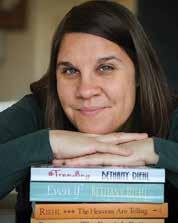
I wasn’t allowed to mope out loud, so I did it in secret. Jealousy for my siblings and neighbors consumed me so that I almost hated everyone in the beginning.
My mother was a hospitable woman, kind and generous. She often had guests in our home to share meals, whether they be family, neighbors, or strangers. She would hand me dough to knead in the bowl, or a bowl and nestle to grind herbs, making use of my hands as I leaned against the wall, useless legs spread out before me. Because of her generous spirit, children felt welcome in our home, and those children, always staring at me with curious eyes, were encouraged to talk with me and ask questions. Some avoided me altogether, but many befriended me. My old friends even came back around. My mother’s no-nonsense way of including me in conversations and giving me jobs to do went a long way in helping me to speak up and talk with our guests.
Four such children continued to come, through the years, trying to teach me what they were learning in Hebrew school now that I wasn’t able to go. They asked me intellectual questions, and let me exercise my mind. They let me grow with them in my own way, and their friendship helped me set aside my jealousy and anger, although it hadn’t fully gone away.
They made a habit of carrying me to the places they wanted me to go, no matter how I protested – their weddings, the street to sit in the sun and greet passersby – when they thought I’d grown too melancholy in the house.
Some days were too cold to sit outside.
That Sabbath was such a day.
I’ll never forget how they came in, cheeks red, eyes ablaze telling me what they had heard, what they had seen. They were full of excitement, talking all at once, their words tumbling over one another until I finally hollered to get their attention.
“He speaks as one who has authority—” one repeated.
“—and not at all like the scribes,” interrupted another.
“And then came the man with the unclean spirit! I felt my stomach turn over when he first called out; but my knees started knocking together when He sent the demon away.”
I furrowed my brow. Had they been drinking? It was Sabbath! And the morning! I pounded a hand on the dirt floor repeatedly as hard as I could until they blinked at each other, then looked at me.
“Sorry, Friend,” one said, sitting near me. They all followed suit, but their knees bounced as if they couldn’t sit still.
“It’s that man that we heard about; the one that John baptized. They say the heavens opened and something like a dove came down to rest on Him and they all heard a voice from heaven that said, ‘You are my Son, in whom I am well pleased.’ But then He walked into the wilderness and no one saw Him again for well over a month.”
I nodded, remembering. “So, He’s been seen again?”
“He was in the synagogue today. Teaching with authority!”
“It’s like nothing I’ve ever heard. Speaking as if He wrote the Scripture Himself! And then that man with the unclean spirit started to yell, calling Him the Son of God!”
A shiver went through me. I’d heard of this man with the demon; he wandered the streets at night, crying out and scaring everyone. No one could contain him. But as far as I knew, he’d never entered the synagogue. What would compel him now?
“Wait, what did you say?”
In my wondering, I had missed the rest.
“This man, Jesus of Nazareth, told the demon to be silent and to come out of him. And it did. It cried out loudly – oh, what an awful noise it made – and drove the poor man into convulsions on the way, but out it went.”
My friend slapped his hands together and shot one out like a rock soaring from a slingshot.
As I listened to them telling me of the man – “Plain as can be. You wouldn’t even stop to look at Him on the street” – a low hum began to build outside the window. I’d heard it before, most recently when John had begun to preach in the wilderness, then after Jesus had gone to him to be baptized in the Jordan, the streets had been full of chatter and conjecture, questions and opinions, until all of the conversation grew to a fever pitch.
It hummed like that again, and my friends stopped talking and listened. One stood and hurried outside.
Two women passed by the window, talking fast. “The fever is gone?”
“Yes, she’d been down in bed for days. I know Simon and his wife were getting worried; she’d been burning up and sweating, not making sense when she talked.”
“So He’s a doctor then?”
“What kind of doctor can touch a woman’s hand and immediately cure a fever?”
We stared at one another, trying to make sense of what we’d heard. Our friend returned and told us the story on the street, passing from house to house as people spread the news while keeping Sabbath.
“Simon, the fisherman. He’s begun to follow this Jesus. When they left the synagogue, He entered Simon’s house and they told Him about the sick mother-in-law. He went to her, took her by the hand and the fever left her. She even got right up and began to serve them. It’s like she was never sick!”
Simon the fisherman. His house was a Sabbath’s walk from mine. I felt my face go flush and looked down at my legs, covered with a blanket. Where my friends’ legs were muscular and tanned from the sun, mine were shriveled and pale. Useless. But if this man taught the Scriptures with authority and cast out demons and could rid a fever like it had never even touched upon a person…
Last time I had a fever, it took me days to recover once it was gone; it had drained me. And yet the woman was serving the household, immediately?
I looked up to find four pairs of eyes watching me, their cheeks flushed with hope. My heart began to pound, and I shook my head before they could suggest it.
They pressed, but I pressed harder. I didn’t want to be carted down the street, in front of everyone, only to be turned away.
And if this man was sent from God, I had no right to face Him. Not after the way I’d cursed Him.
One by one, their pleas dropped off and they returned to their own homes as the sunlight on the wall opposite of me softened from yellow to orange to purple, then black. Sundown on the Sabbath.
Soon, the noise in the street grew to a fever pitch. My mother stood in the doorway, watching, telling me what she saw.
“There’s little Hannah, helped along by her parents. Oh, her limp has gotten bad; she never did heal right after that fall. They’re going to Simon’s house. And Joel, too; his cough has kept him home for weeks now. Oh,” she grimaced, “he can barely walk, the cough seizes him so. Oh! There’s his son to help.”
On and on she went, telling me of everyone that passed and gathered at the door of Simon’s house. Then, eyes wide, her voice high and hurried, she spoke as they passed again. Hannah walking straight. Joel’s cough was gone, his pallid skin healthy again. It seemed the whole village had gone to Simon’s and come away whole. Healed.
Because of the man from Nazareth.
I lay still all through the night. Thinking, praying. Wondering if I had a right to pray. It seemed I was more aware of each and every sin of my soul than I ever had been before. I related to the words of David in the psalm, “For day and night Your hand was heavy upon me…”
My sins piled up like bricks on me.
Maybe if I could be a working man, I could ignore the guilt, push it away. But having no way to escape my thoughts, I turned them over and over in my mind. If I could just walk…but could I outrun my sin? No. But perhaps I could work hard enough to outweigh it. If I could only walk…
Above the din in my head, one word rang out above the rest. Authority.
The Man had authority like no one I’d ever heard of.
To teach the Scriptures. To cast out demons. To heal the sick. But, did He have the authority to make the lame walk? Noth-





Attorney Dani Grigg
ing like it had ever been done. Not even into the night as mother watched neighbors and strangers walk to Simon’s.
Did He have the authority to remove sin?
By daybreak, I had decided. But before I could send mother for my friends, they arrived, a determined glint in their eyes. I nodded, already ready to lay down on my pallet and let them carry me to the Man. This Healer with authority.
I clenched my eyes against the morning sun as we made our way, so afraid to hope. What if He sent me away?
What if He couldn’t heal me?
But what if I didn’t try? I heard the low groan of the crowd as my friends joined others that had also waited through the night before they decided to give the Healer a try. Simon and his brother, with James and John and a few others came out, but not Jesus.
My friends set my pallet on the ground and sat with me. But as we waited, watching where Simon and the others had gone, a cold fear swept through me. It rose the hair on the back of my neck and made my fingers tingle and jerk nervously.
One of the men that had followed came back, rubbing the back of his neck. He spoke to someone near the door and gestured toward the wilderness.
Soon the questioning murmurs of the crowd grew into loud protests.
The Healer was gone. n

Bethany Riehl lives in the Treasure Valley with her husband, three kids, and a dog. She writes articles and fictional novels when she can, and her one desire is to point others to the love and sufficiency of Jesus Christ.






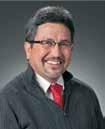


By Jenna Dexter
As I loaded my keyboard into the back of my Mini Cooper and took off for the next thing in my crazy hectic week, I took a moment to mentally pause, draw in a deep breath, and chat with God.
Because He’s my person.
He’s my calm in the storm, my peace in the busyness. He’s my source of strength when I’m feeling weak, frazzled, and at risk of losing my mind.
In general, I’m a fan of creating space, setting boundaries, and living a life that does not involve moving from one commitment to the next with no time to spare. But this turned into a particularly jam-packed week. I was already scheduled to help with worship at a church an hour away, which meant preparing for a Wednesday night rehearsal and two Sunday morning services. But I was also asked, last minute, to lead a 40-minute set at my own church on Saturday night.

On top of all that, my coaching business and several other activities created an especially crammed week of “doing”. Going from one thing to the next to the next.
I know you’ve been there. Perhaps you are right now.
But lucky for me, I had already become increasingly intentional about my connection with God. In every detail of my life, throughout my day, I had been talking to Him about what my next step is and running into His presence for the incredible peace and bliss that only He can give.
I cling to you; your strong right hand holds me securely (Psalm 63:8 NLT).
So as I drove down the road that day, with no other activity stealing mental space, I seized the moment to connect with God. I invited Him into my circumstances, asked Him for strength and energy to do everything that needed to be done, and to help me mentally stay on top of the most important things.
Tethered to God, like a toddler to her “person” – And I suddenly had an image of my darling 2-year-old granddaughter, Claire. Whenever she was in a public place and began to wander, it was never long before she’d realize her “person” was uncomfortably far away. Immediately, she’d come running back, clinging to the leg of Mama, Daddy, or Nenna (that’s me!).

She was “tethered”, you might say, by an invisible string that only allowed her to wander so far without recognizing the need to fully reconnect with her source of safety, love, peace, guidance, and provision.
It made me smile to think of myself like my little Claire Bear, wandering into the bustling world, but never wandering too far without recognizing the need to fully reconnect with my source of safety, love, peace, guidance and provision. My “Person”. The name of the LORD is a strong fortress; the godly run to him and are safe (Proverbs 18:10 NLT).
King David stayed tethered – King David loved running into the presence of the Lord. In Psalm 16, he writes:
Keep me safe, O God, for I have come to you for refuge. I said to the LORD, “You are my Master! Every good thing I have comes from you” (vs. 1-2 NLT).
I will bless the LORD who guides me; even at night my heart instructs me. I know the LORD is always with me. I will not be shaken, for he is right beside me. No wonder my heart is glad, and I rejoice. My body rests in safety (vs. 7-9 NLT).
You will show me the way of life, granting me the joy of your presence and the pleasures of living with you forever (v. 11 NLT).
If you think your life is stressful, imagine the pressures of ruling a country, riding into battles, and being hunted for 13 years. How did David do it? He stayed tethered to his Person.
Are you tethered to God in this season of your life? – Are you intentional about making time and space for Him, inviting Him into your circumstances, and finding even five minutes in the car to reconnect with Him?
Perhaps, like my story, you aren’t extra busy. You’re extra anxious, fearful, or sad because of the circumstances of your life. You could be battling an illness or struggling to survive a difficult marriage. Your days might be spent at your child’s hospital bedside praying for a miracle.
These circumstances create all the more reason to stay tethered to the presence of the Lord, to the peace that passes understanding that only He can provide.

I felt that peace when my dad was in hospice and when he passed. Because I sought it continually. The Lord was faithful to uphold me and my family by His right hand. He provided what I call “God hugs” in the midst of a very painful time, and looking back at it over a year later, the warm memories of that season suppress the sad ones. Only God can do that.
But it is our choice to intentionally connect with Him and create an atmosphere where He can prove His faithfulness. It is our choice to feed on the promises in His Word, invite Him into our circumstances and experience the presence of the Lord in everything we do. He is always there. He is always fully accessible. And He is always longing for you to run into His arms.
Are you tethered to God like a toddler to her “person”? n
Jenna Dexter is a speaker and Christian Life Coach for Women. Through 1:1 Coaching, she helps women find clarity, shine in calling, overcome mental hangups, unleash confidence, and believe in possibility. Her membership community, Total Thrive Women, empowers Christian women to achieve Personal, Spiritual & Professional results through Group Coaching, Community Forum, and Personal Development Trainings. Learn more at TotalThrive.com and find links to her Podcast & YouTube channel.

The Spring Caldwell Prayer Walk will be held on Saturday, April 12, at 3 p.m., starting at the band shell at the Caldwell Memorial Park. People may stay at the park to pray if they prefer.
“We walk around downtown, praying at the gazebo, the Indian Creek Plaza, police and fire stations, and at city hall,” said walk organizer Arlene Robinett.
“We pray for all peoples in all walks of life. We pray for a day shelter for our homeless people and for food insecure people. We pray that gang members will be ministered to and find Jesus in their lives and know how much they're loved,” Robinett said. “And we pray for more of God's righteousness to come into Caldwell.”
This is a family event for people of all ages. Following the prayer walk, participants return to the park for a potluck.
For more information contact Robinett at (208) 391-8516. n
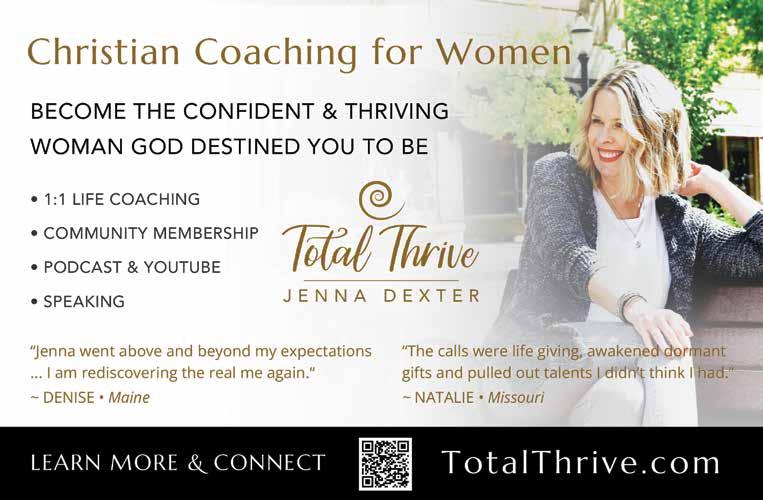
By Larry Banta
Driving through southern California one day, I noticed a sign on the exit in the grassy median, advertising that “we only use recycled water.” It made me start to think about water in general and wondering for the next several miles how you could find water that was not recycled? Maybe deep in a glacier somewhere? We have the same water that was created with our world, using it over and over. Water is an amazing substance.
Have you ever stopped to consider water? It regularly pours out of our faucets, we shower, wash our clothes, drink it, mix it with flavoring. We use it without even thinking about it. We actually cannot live without it. Our bodies are mostly water.
Jesus often spoke of water, using it to help explain some important spiritual truths. He met the woman at the well and offered her more than just water for her physical thirst. As the Creator he offered her the water of life.
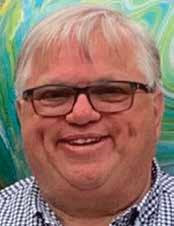
In John 4:13,14 we read: Jesus answered, “Everyone who drinks this water will be thirsty again, but whoever drinks the water I give them will never thirst. Indeed, the water I give them will become in them a spring of water welling up to eternal life.”
A very simple substance, it is a molecule of just three atoms. However, the properties of that combination of atoms are almost beyond description. During college, I was privileged to do protein research in the biochemistry department. The chemistry library, a fascinating place, held my attention many afternoons as I perused the volumes of very interesting phenomena. I noticed one day, on the bottom of a shelf, a large two-volume set of books called simply, “Treatise on Water.” Curious, I picked the volume up with some effort to take a look. It was over 4,000 pages, mostly beyond my understanding. It was full of formulas and properties of that simple substance, all the things that it could do. Small wonder Jesus compared the water of life to the water we know so well and cannot live without.
Some years later, for about one year, my family and I resided on the border of Uganda and Kenya with the Pokot tribe in a village called Kiwawa. We arrived at just the end of a major famine and drought. Conditions were challenging to say the least. I was a family physician at the time. The people there struggled to find water much of the year as the rivers had all gone dry. Over-grazing had occurred, with loss of the trees and grass, which dried up the watershed. At that time many people were traveling five miles or more each day to get water and carry it back to their village. Often, they would dig into the sand of the riverbed and find some water. Soon the local wildlife would find it as well and drink it even lower.
Sometimes the local animals would dig deep enough in the riverbed that the people could take advantage. Rain was infrequent and clouds were often disappointing. Over the years we would often speak of Pokot clouds. Severe dark, threatening clouds gather, then thunder and lightning and more darkness, a bit of wind…then a slight hole in the clouds, a bit of blue sky and then, so quickly, almost complete dissipation of the clouds. Sometimes it would rain at the wrong season, and there was no way to store the water in the ground. The watershed was dried up.
Diseases from lack of water were common. Skin was easily infected. Ulcers would develop that were at times quite large. We were daily dealing with all of the problems from lack of water. Women in labor would become severely dehydrated; others with minor illnesses would become quite ill or die due to the lack of water.
Then came the wells. At that time, wells were being drilled but at a very slow speed due to the hard rock below the surface and the water being so deep in the ground. It might take 3-4 months to fully develop the well and install a hand pump. One day an inventor showed up with a new drill bit that he wanted to try out with us. He hooked
the new bit on the drill and we saw it go deep in the ground – very quickly. Pipes were added and within 12 hours a new well was in place. Then in a very short time, there were four wells near us. People gathered around the wells to bathe, drink and fill their containers. Skin became healthy, people were hydrated, and life was better. Water gave them new life. In many areas the new wells were the gathering point where local preachers could also provide the real water of life.
Revelation 22:17 says, “The Spirit and the Bride say, ‘Come’. And let the one who hears say, ‘Come’. And let the one who is thirsty come; let the one who desires take the water of life without price.”
And Isaiah 12:3: “With joy you will draw water from the wells of salvation.”
After our year in Pokot, we moved to an area of central Rift Valley near a town called Maralal. This was in the mountains at a high elevation so the weather was very nice. Every day we would go to what is called a ‘sink’ to get our water. This is where the water table is at ground level. We would just dip our buckets in and get all the water we needed.
One day the elephants came in a large herd. They drank all the reachable water from the sink. We then had to travel for water, which could be as far as 10 miles every few days, to a flowing stream. The water was very precious. During the week, along with seeing patients with various interesting problems, and sharing God’s love with them, we would go out to the various manyattas (a collection of residences surrounded by a thorn fence) and gather people together for a Bible lesson or sermon. On Saturdays we would gather about 10 or so men and go drive around the bush looking for water deep enough to baptize. It was a weekly routine and took many hours.
After services on Sunday, we would load up maybe 20 people in our Toyota Land Cruiser to head to the chosen spot for baptisms. Some weeks there were 8-10 and sometimes only one or two. This was another use for that amazing substance: following Christ in obedience, starting a new life in Christ.
John 7:37-38 reads: “On the last day of the feast, the great day, Jesus stood up and cried out, ‘If anyone thirsts, let him come to me and drink. Whoever believes in me, as the Scripture has said, out of his heart will flow rivers of living water’.”
Consider the water; it is life-giving, lifesaving and comprises most of our bodies. So, when Jesus says He will give living water, we understand that just like water, He gives us life and sustains our life with His spirit so that we become springs of living water. That water springs forth from us to nourish the seeds planted in others.
From Revelation 21:6: “And he said to me, ‘It is done. I am the Alpha and the Omega, the beginning and the end. To the thirsty I will give from the spring of the water of life without payment’.”
May the water of life spring forth from us to the thirsty souls around us. n
Dr. Larry Banta is an author of several books, a retired psychiatrist, and a former missionary. He served in India, Mexico and Kenya. He and his wife, Evelyn, a counselor, travel together to provide consultation and training in various international locations.
By Roxanne Drury
We often hear that kids can be mean. Unfortunately, they can be. I remember being taunted as a young child because I wore hand-me-down clothing. The words used to tease me crushed my tender heart, and the pain they caused stayed with me for years. They were hurtful and made me feel as though I didn’t belong at the private elementary school I attended.
As an adult, I came to know the Lord, but because of lingering pain and hurt, I still felt excluded and like a foreigner among those in my close church and work circles.
I can only assume that others, perhaps you, have experienced the same or similar pain – the kind that erodes our self-confidence and self-esteem.
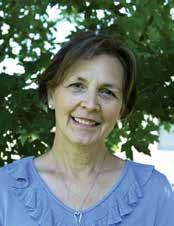
After years of reading and studying God’s Word, I finally fully understood just how wrong my thinking was. Check out Ephesians 2:11, NLT: “Don’t forget that you Gentiles used to be outsiders. You were called ‘uncircumcised heathens’ by the Jews, who were proud of their circumcision, even though it affected only their bodies and not their hearts.” Paul spoke to the Gentiles about their lives before they knew (accepted) Christ as the Messiah.
He continues in verses 12-13 of Ephesians chapter 2: “In those days, you were living apart from Christ. You were excluded from citizenship among the people of Israel, and you did not know the covenant promises God made to them. You lived in this world without God and without hope. But now you have been united with Christ Jesus. Once you were far away from God, but now you have been brought near to him through the blood of Christ.” Now, Paul says, you know and have accepted the truth of who Christ is and what He has done for you by sacrificing Himself, and that brings you closer to God.
This is what I learned from these verses: accepting Christ and His sacrifice changes our belonging status. Jumping down to verse 19, it says, “So now…” (meaning now that you have Christ in your life), “you Gentiles are no longer strangers and foreigners. You are citizens, along with all of God’s holy people. You are members of God’s family.” In Scripture, we see in Acts 16:20-23 that strangers and foreigners had no rights or privileges. But God welcomes us into His family as “citizens” when we accept His Son into our lives, granting us full rights and privileges as His sons and daughters. Regardless of our clothing, background, or the choices we have made, we – you and I – belong. We are fellow citizens of God’s eternal kingdom. I love how verse 19 of the Message version reads: “That’s plain enough, isn’t it? You’re no longer wandering exiles. This kingdom of faith is now your home country. You’re no longer strangers or outsiders. You belong here with as much right to the name Christian as anyone.”
We belong! You belong here, in God’s family. This world is our temporary home; our true citizenship is with God in heaven, where we belong (Philippians 3:20).
Think about these things:
1. Do you have Christ in your life? If not, I urge you without delay to talk to your pastor or go to my website at www.roxannedrury.com and read “Seeking God to Know Jesus.”
2. If you do have Christ in your life, what does it mean to you to know with certainty that you belong to the family of God? n
Roxanne Drury is a wife, mother, grandmother, and retired Christian preschool teacher who served the Lord in children’s ministry for over 45 years. She has written a group study guide on Psalm 23, as well as other books. She may be reached at glorylandbooks@gmail.com.





By Gaye Bunderson
Abraham Lincoln’s reelection. The Red Cross’s founding in Geneva. Nevada named America’s 36th state. Boise declared incorporated, with roughly 500 to 1,600 citizens, depending on the source. That was the world, the U.S., and Idaho in 1864. And a church originally called Missionary Baptist Church was founded the same year.
A man named Hiram Hamilton was the church’s founder. He’d come west to start churches and bring the gospel to Indian tribes. His first church was in Idaho City, at the time a flourishing ‘gold rush’ community. He then turned his sights to Boise, where he planted a church in the town courthouse. Boise, at the time, was said to be full of “rough-looking and bearded miners and mule drivers.” Rev. Hamilton called them all into his church.
On September 11, 1864, the reverend led the first worship service of the Missionary Baptist Church. Later, he raised funds for the construction of its first building. (The information in the two paragraphs above was compiled by Bruce Young.)
The church was established in downtown Boise, and it remains in the city’s core to this day, albeit in another building. Last year marked its 75th year in its current structure at 607 N. 13th Ave. That building is its third one and the house of faith now bears the name True Hope Church – also its third name in its 161-year history. After its birth as Missionary Baptist Church, it became First Baptist Church in 2014. The name change to True Hope came in 2018. Its long-time pastor, Bruce Young, now retired after 30 years, said of the name switch: “People are looking for hope, not Baptists.”
He continued: “The name change was driven by the culture and the definition of what church is. Not so long ago, people thought churches were bad. Now, people have seen the falling apart of society, of our foundation and morals, and are thinking, ‘Things are falling apart, and we don’t know why, but maybe we can figure it out [by a return to church]’.”
The original church shared its space with other churches, including Presbyterian and Methodist denominations. It was also used as a school.
Its leadership started out, even in the late 1800s, seeking to create a Christian site that welcomed all. Information from a booklet detailing the institution’s “160 Year Legacy,” reads: “Membership grew to 1,200 and served their community with Bethel African Mission Sunday School, Women’s Mission Circles, a Japanese Sunday School,

and the Blazing Arrow Trail Boy Scout Troop (whose history included being one of the oldest Boy Scout troops ‘west of the Mississippi’).”
The church is still a welcoming one, as well as a growing one. Said Young: “We have three campuses and are planning a fourth.”
The campuses sit in sites around Treasure Valley. “Our vision is helping other churches – planting churches and revitalizing current churches. We want churches that preach the Bible. Recently, in the last 10 or 15 years, we got back to our roots, the mission of the church. This church has helped dozens of churches – like the older church helping the younger ones.
“We’re not a big church; we want intentional reproduction. Very few churches are still having babies. We are following the mandate to ‘go make disciples’. We’re taking the Great Commission and applying it to churches. Healthy churches can help churches that help the community.”
“God is working,” he continued. “Churches are Christ’s main vehicle to reach the world and transform society. As the church goes, so goes the town.”
Boise’s vitality and positive population hint that the church has made a valuable contribution in its lengthy history.
There are 470 people who presently attend True Hope Church in the so-called City of Trees.
“When people come here, they have a deep sense of a calling that isn’t just a flash in the pan,” said Young.
Dena Myers, operations and missions pastor at the church, stated, “We’re not just one slice of the pie; we have people of all ages, all walks of life. It’s like Boise itself in that way.”
Gone are the days of rough and scruffy miners and mule drivers. But, without a doubt, were those men to walk through the doors of today’s church, they would be greeted with warmth and encouragement, just as they were at the church’s inception.
Young said that many churches focus primarily on one demographic, such as the older population, the young marrieds, etc. Both Young and Myers agreed that True Hope is cross-generational, with children and grandparents – and they don’t mean that as a biological connection but rather, though they are biologically unconnected, they are nonetheless related in the family of believers.
Myers said that not being limited congregationally “is such a benefit; it’s just a beautiful thing, the kids and the older people together.”













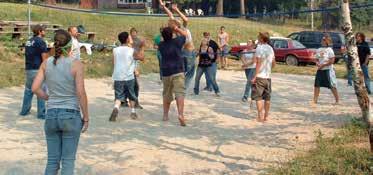
Socioeconomic factors play a big part in the look of the congregation as well.
“We’re downtown,” Young stated. He explained that 10 to 15 percent of the people who attend True Hope are homeless and poor. For instance, City Light, a program of Boise Rescue Mission Ministries, is just one of the buildings and programs that is in the downtown core, and True Hope is eager to welcome its residents.
“These are people on the edge of survival, but they are enriching the church. They integrate and they take on ministries. They’re engaged in the congregation, and until they engage with” – he searched for words and came up with – “regular sinners, they’re locked into addiction. In church they realize they’re not the only people with problems, and that some people with money, and lots of it, have their own serious issues.”
What about believers who look down on people in the so-called down-and-out category? “They aren’t here,” Young said, without remorse for their absence. “Pruning is good,” said Myers. “Some people come here and say, ‘This is not for me’, and they leave our church and the pruning is good.”
Young continued, “We’ve always been involved with the Mission, but it’s progressed. It used to be ‘them’ and ‘us’. Now we’re all just ‘us’. It’s astounding the disparity between the rich – even the very rich – and the poor. And yet they sit together and talk.”
It sounds like the kind of church that the Rev. Hamilton would be proud of – the same man who encouraged the mixing of many through the lessons of the gospel he came west to preach. His influence appears to be continuing to flow down into a new era. n
(Editor’s note: A local church that True Hope originally started with also celebrated its anniversary last year. Also, the interview with Bruce Young took place late in 2024. He retired late in January of this year and is being replaced by a new leader, who is starting in his position in April.)
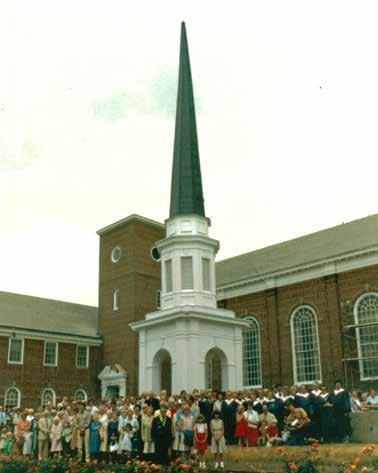

















After Giants’ relief pitcher Gary Lavelle became a born-again Christian in the winter of 1976, other players followed, including pitcher Bob Knepper, shown above. (Photo from @S.F. Giants; used with permission)
By Matt Sieger
Depending on your spiritual bent, you may have been either thrilled or turned off by University of Connecticut women’s basketball star Paige Bueckers talking about her Christian faith in postgame interviews on her way to the semi-finals of the NCAA tournament.
“I’m a living testimony. I give all glory to God,” she told ESPN. “He works in mysterious ways. Last year [after injury], I was praying to be back at this stage. He sent me trials and tribulations, but it was to build my character. It was to test my faith to see if I was a believer. But I just kept on believing. I did all I could, so God could do all I can’t.”
Some probably feel, as Beneatha Younger put it in Lorraine Hansberry’s play, “A Raisin in the Sun”:
“I’m just tired of hearing about God all the time. What has He got to do with anything? . . . I just get so tired of Him getting the credit for things the human race achieves through its own effort. Now, there simply is no God. There’s only man. And it’s he who makes miracles.”
The media and the public are now accustomed to hearing athletes thank God for the abilities He has given them. But that wasn’t al-
ways the case. In baseball in the 1950s and ‘60s it was extremely rare to hear such pronouncements from athletes. Then in the 1970s in San Francisco, one of the great culture clashes between religious athletes, the media and the fan base erupted over a group of born-again ballplayers on the Giants who became known as the God Squad.
Giants’ relief pitcher Gary Lavelle became a born-again Christian in the winter of 1976. When he returned to the club the next year, he gradually and quietly began to share his faith with his teammates when they showed an interest. Several, including Bob Knepper, Jack Clark, Rob Andrews, and Randy Moffitt (brother of tennis great Billie Jean King) came to faith, and by the 1978 season there were eight or nine professing Christians on the team.
The Giants, who had suffered through several losing seasons, came to life that year and led the National League West for much of the season, only to fade in a September swoon and finish third. In postgame interviews, the players frequently thanked God for the ability He gave them, and the press raised no objection.
But when the Giants’ fortunes faded on the field in 1979, the media was quick to blame the born-again players, claiming their newfound faith had made them passive. The press derisively referred to them as the God Squad.
The cornerstone of that accusation was a quote attributed to pitcher Knepper, who supposedly told manager Dave Bristol it was “God’s will” when he yielded a home run that lost a game. Knepper and his Christian teammates have always denied the quote, as did Bristol. But the false story continued to hound them for years.
The media was merciless at times. San Francisco Chronicle columnist Glenn Dickey wrote, “It may be that the Giants will have to trade one or two of the most obvious born-agains on the club, to break up the clique. At the very least, their lockers should be separated in the clubhouse.”
Another prominent Chronicle sports columnist, Lowell Cohn, told me recently that he disagrees with Dickey on that score. However, Cohn, known for his biting satire, penned one of his most provocative pieces, “Can Satan Save the Giants?” in which he recommended that one of the Giants sell his soul to the devil since God didn’t seem to be helping the team too much.
Not only did the media blame the God Squad for losing, it also alleged that the Christian athletes caused division in the clubhouse and got two managers fired. These false claims spread to the national media, where prestigious columnists Peter Gammons of The Boston Globe and Dick Young of the New York Daily News repeated them. One of the more ridiculous accusations was that the Giants had two team buses to take players to the field, one for the God Squad and another for the others.
Mike Ivie, one of the God Squadders, returned to the club from a stint of mental exhaustion and sounded much like Paige Bueckers, who had made a comeback from physical injury.
“He’ll put you through trials and tribulations and He’ll use every resource to help you find happiness in your heart,” said Ivie. “It would have been twice as hard for me to come back if I hadn’t believed in the Lord.”
Ivie and his teammates commonly made such pronouncements in a liberal San Francisco atmosphere that was not conducive to talk about faith. Cohn felt the tension and in his memoirs made this fascinating statement, “Until that day, I believed I was covering a baseball team. I was wrong. I had wandered into the middle of a deep religious debate, one that defined the Giants at that time.”
The God Squadders were spiritual pioneers who bore the brunt of attacks by the media. They paved the way for Paige Bueckers and other Christian athletes to speak boldly about their faith. n
Matt Sieger, now retired, is a formers sports reporter and columnist for The Vacaville (California) Reporter. He is the author of “The God Squad: The Born-Again San Francisco Giants of 1978.” This column first appeared in The Vacaville Reporter.
By Greg Grotewold
If you walk in my statutes and observe my commandments and do them, then I will give you your rains in their season, and the land shall yield its increase, and the trees of the field shall yield their fruit. (Leviticus 26:3-4, ESV)
For certain seasons of my life, I’ve operated under the maxim – and foolishly so – that good intent coupled with hard work will yield a result commensurate with the effort. I’ve been in one of those seasons before, a prolonged one, and discouragement mounted. The only thing my labor appeared to be producing was frustration. The harder I tried, the further away my targets got.
It’s not that the maxim, in and of itself, is necessarily bad. The Lord expects me to labor for that which is good and right. And I have been doing just that, but here’s where my theory breaks down and my foolishness becomes evident. Extending the harvest metaphor used in Leviticus above, I’ve been diligent in scattering seed but have failed in actually planting it. There’s a fundamental difference between the two. Scattered (indiscriminately thrown) seed does nothing more than wash away when the rain comes. Planted seed, where the soil is first properly prepared, germinates. If God’s Word is the seed, our soul’s the soil in which the seed is placed, and God’s supernatural blessing the rain that falls on soil prepared to receive it, I shouldn’t be surprised when my efforts don’t produce a harvest. Until the ground is broken, no amount of rain is going to cause the seed to take root and bear fruit.
I need to prepare for rain. I need to work the soil of my soul and expose that which is buried beneath the surface. I need to dig up and sever the roots of those strongholds that too often have rendered the rain useless. There’s one particular bastion that must be named; it’s called control. I
have an inherent need to shape life’s circumstances and thus its outcomes. During the foolish seasons, I become relentless in my pursuit.
I know theologically and intellectually that the Lord is the One who orchestrates the supernatural and that I am but a means through which His will is achieved. I know that. But when I’m not cultivating my soul, it, like dirt, hardens, and I become my own sovereign force. I walk in my statutes, not the Lord’s. I obey my commandments, not His. And seed washes away. How do I cultivate the soil to receive my season of rain? How do I prepare my soul so God can bless my efforts? How do I more consistently walk under God’s authority? Jesus makes it clear in John 15:4-5: “Abide in me, and I in you. As the branch cannot bear fruit by itself, unless it abides in the vine, neither can you, unless you abide in me. I am the vine, you are the branches. Whoever abides in me and I in him, he it is that bears much fruit, for apart from me you can do nothing.”
I cultivate my soul by clinging to Jesus. I fasten myself to Him. I die daily to myself and pursue Him. I make myself vulnerable, acknowledging that without Him I am dust. I surrender my will and embrace His. I reacquaint myself with His full character and trust He is the God He says He is. I rest under His protective wing knowing that He loves me and wants only the best for me. I lean on Him like the utterly dependent person I actually am. I lean on Him like the utterly glorious force He actually is. And I do it daily.
A soul that reflects that kind of reality is a soul whose labor will be met by the almighty power of the living God. It’s a soul that’s well positioned to receive the blessing of Psalm 90:17: “Let the favor of the Lord our God be upon us, and establish the work of our hands upon us.” (ESV)
May we prepare for rain and secure His favor upon our labor. n
Greg lives in Oakdale, Minn. with his wife, Sandi, and their two sons, Luke and Eli. He is a deacon in his local church and greatly enjoys serving in this capacity.








By Bradley Shotts
Recently, I was reading a Facebook post that asked this question, “What do you struggle with the most pertaining to the Bible?” It was interesting reading various responses. The one that caught my attention was from a gentleman who said, “I know that God cannot forgive me of my past.” Just in that short sentence I could feel his despair and anguish. I could not resist responding to his comment and I hope and pray what I told him gave the encouragement that his soul desperately needed.
This gentleman obviously had some difficult days in his past, where he most likely made some poor decisions. Haven’t I just described every single one of us? You, me, we have all made poor decisions in the past and every one of us has things hanging in our closet that we wish were not there. But there is something else going on here behind the scenes that warrants immediate attention.
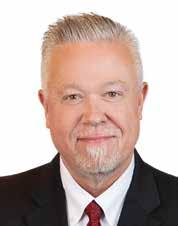
Most people never take into account the spiritual warfare that rages and battles 24/7 behind the scenes of our lives. While we are going about each day, there is a war raging between God and Satan on who will win each soul for eternity. It is Satan’s daily objective to discourage, deflect, lie, cheat and steal, and to say or do anything to throw us off course and away from God.
One area that seems to do the most damage and cause so many people to struggle is their past. You probably are familiar with those who seem to live in the past. They focus on past experiences and hurts, disabling them to live in the present, and in most cases, robbing them of the blessings and joys of today. In essence, they are exactly where Satan wants them to be.
It is impossible to live a victorious life when you constantly concentrate on past events that crippled and hurt you. The word ‘crippled’ is an accurate description, because not only did it cripple you then, but because you refuse to let go of it, it continues to cripple you again and again day after day. Satan basically has you on autopilot, robbing you of any future happiness and joy. Not only has your life stopped, but you are also stuck, and you are defeated.
This is the exact opposite of where God wants you and how He desires for you to live. Some sink so low in desperation that they have thoughts of taking their own life. The truth is, no one actually wants to take their own life, they just want the pain to stop. Trust me when I say... Jesus can take away your pain. The Bible says that He can make all things new. God desires this for your life. Stay with me as we look into how we can fix this crippling dilemma.
The first thing to know and understand is this… You are incapable of repairing this on your own. Let’s face it: isn’t that what you have been trying to do now for years? It does not work. The only way to become free of your past and all of the hurt that comes with it is to hand it over to God. It is only through His power, forgiveness, love and grace that anyone can become free of this devastating bondage. It is important to mention that for a lot of people, this fact just revealed is either never carried out or not believed, thus never resolving a devastating way of life. It is crucial to know and understand that it is only through God that change will occur.
Secondly, the Holy Word of God is very specific in teaching that the blood of Jesus that was shed at Calvary was shed for the purpose to completely and totally wash away all of our sins. The blood of Jesus paid the price for every wrong that you have done. When Jesus said on the cross, “It is finished,” that is exactly what
He meant. It is finished! Jesus died on the cross and paid the price of sin for all of us.
Lastly, you need to understand this profound statement… “God does not care about your past. He cares about YOU and your future.” Let that sink in.
You may have had some really terrible things happen to you. While that is unfortunate, it is also time for you to begin living again, putting your past in the past and moving forward with God, living a life of promise and hope. Paul, an apostle of Christ, who before his conversion would torture and kill Christians, was able to put his past behind him through the power of God. He writes in Philippians 3:13, “Brothers and sisters, I do not consider myself yet to have taken hold of it. But one thing I do, forgetting what is behind and straining toward what is ahead.”
Let’s give our past to God, shall we? Pray this prayer with me, please:
Father, for so long now, I have allowed Satan to use my past to dictate my life, to run my life, and to ruin my future. Father, I come to You now asking You to please forgive me of all my past sins. I know that I cannot do this on my own. I am only victorious through Your power and because of the blood of Jesus that was shed for me. I give You my past, my hurt. I ask You to come into my life, into my heart and into my mind and bring forth healing in the name of Jesus. I no longer focus on past experiences; I now look ahead where You have placed my feet on solid ground… New ground where I look to You to lead me and guide me. I give my life to You, Lord. I ask You to bring healing and restoration where Satan has trod and has tried to destroy. Thank You, Lord, that through You all things are made new, and I now hold true to Your promises, which are there for me to live by, to have hope, and to be encouraged. Amen.
“So do not fear, for I am with you; do not be dismayed, for I am your God. I will strengthen you and help you; I will uphold you with my righteous right hand. All who rage against you will surely be ashamed and disgraced; those who oppose you will be as nothing and perish.” – Isaiah 41:10-13 n
Bradley (Brad) Shotts began his ministry in the funeral industry in 1988 in Tyler, Texas. He currently serves as a director at Lucas Funeral Home, Hurst, Texas. He and his wife Amy live in Bedford, Texas. They have two adult children, Blaine and Braylee Shotts, and one grandson, Matthew. As God directs, Brad enjoys singing and speaking. He is an ordained minister and loves being used of God.
By Vincent Kituku
There are times when living is not easy, especially after the unexpected death of a loved one. I found myself thinking about the meaningless of life without the spouse you have loved and lived with after talking with a lady whose husband had died in motorcycle accident. I had known about her from her son who told me how much she was suffering. Since she didn’t know me, I introduced myself as her son’s friend and informed her I had been praying for her. Happy that a stranger was thinking of her, she shared about her good and bad days, then she asked, “Why was I left behind?”
I acknowledged that I could not even understand how she was surviving her loss. I refrained from saying that her husband was in a better place. A common statement meant to comfort the grieving person, however, “a better place,” at our moment of grief, would be with our loved one, even for those who believe in life after death. We all want to be with our loved ones forever without the inconvenience of death.
While there is no reasonable explanation of why we are left behind, there is always a reason God does things in His own way. Sometimes we may understand the reason, but other times we have to wait until we cross to life’s other side.
I can’t say all losses are the same. I can only use my grieving experiences after the deaths of sisters and brothers and several other relatives and close friends.
As hard as it may sound, God will help you with your grief. He will comfort you, send loved ones, friends and sometimes strangers to help you bear your loss. Here are some approaches that I have found helpful in many grief-related situations.
1. Accept your loss, your vulnerability, admit any fear or anxiety. Be willing to endure and fully experience your pain and suffering.
2. Think of the highlights of life you shared with your loved one.
3. Find the parts of your situation you can manage easily.
4. Share your loss and its implication in your life.
5. Learn to take less responsibility so you can have time to yourself and avoid being burdened.
6. Turn resentment to forgiveness. Forgive yourself and those you might blame for your loss.
7. Don’t give loneliness a chance. Fellowship with others and attend social events.
8. Seek the meaning of your crisis in terms of your spiritual, social and professional aspects.
9. Solitude, not loneliness, all alone with God does heal the grieving. Tell Him your feelings and accept that He will answer. Give Him time.
10. Figure out, from here, now where? What can you do to better your life and the lives of those who have suffered the same loss?
I would like to expound on this point a little bit. Service to others, especially when not expected, will help you heal faster than hundreds of visits to counseling centers – and you don’t have to pay for it. My philosophy is, “What we do for ourselves can get us by. What we do for others is what gets us ahead, whether in our profession, spiritual pursuits or relationships.” Serve other people who haven’t asked or can’t pay back and you will not only heal, but also prosper in both intangible and tangible aspects of life.
This reminds me of a story I heard of a wealthy woman who lived alone. She had medical problems, had stopped attending social activities, was in a wheelchair and had lost most relatives when she was in her sixties. She contemplated taking her own life. Her unattended material possessions only portrayed the ruins of past glories. But she had a small greenhouse with African violets. In her wheelchair, she had taken care of the plants. She had cuttings of the African violets from which she started new plants.
A stranger who visited her and saw her pain of loneliness, depression and will to die was impressed with her starting the African violets project. He shared that her situation was made worse by her not living as a good Christian. She had money and African violet plants and he suggested she could make a number of cuttings, have them wellestablished and re-planted in gift pots. After that, someone could drive her to the homes of the grieving (from illness, death of loved ones, or lost jobs) or rejoicing (births, graduations, weddings, engagements) people that had been announced in the church bulletin and give them the plants.
She liked the idea and made it happen. After a decade, there was an headline: “African Violet Queen of Milwaukee Dies, Mourned by Thousands.” This headline was followed by a detailed account of how she had touched people’s lives with trademark African violets in her community.
We are left behind to uplift others and manifest the glory of God. n
Dr. Vincent Muli Wa Kituku, motivational speaker and author of “Overcoming Buffaloes at Work & in Life,” is the founder and executive director of Caring Hearts and Hands of Hope, a nonprofit organization that raises tuition and fees for poor orphans and other children from poverty-stricken families in Kenya. Contact him at vincent@kituku.com or (208) 376-8724.
